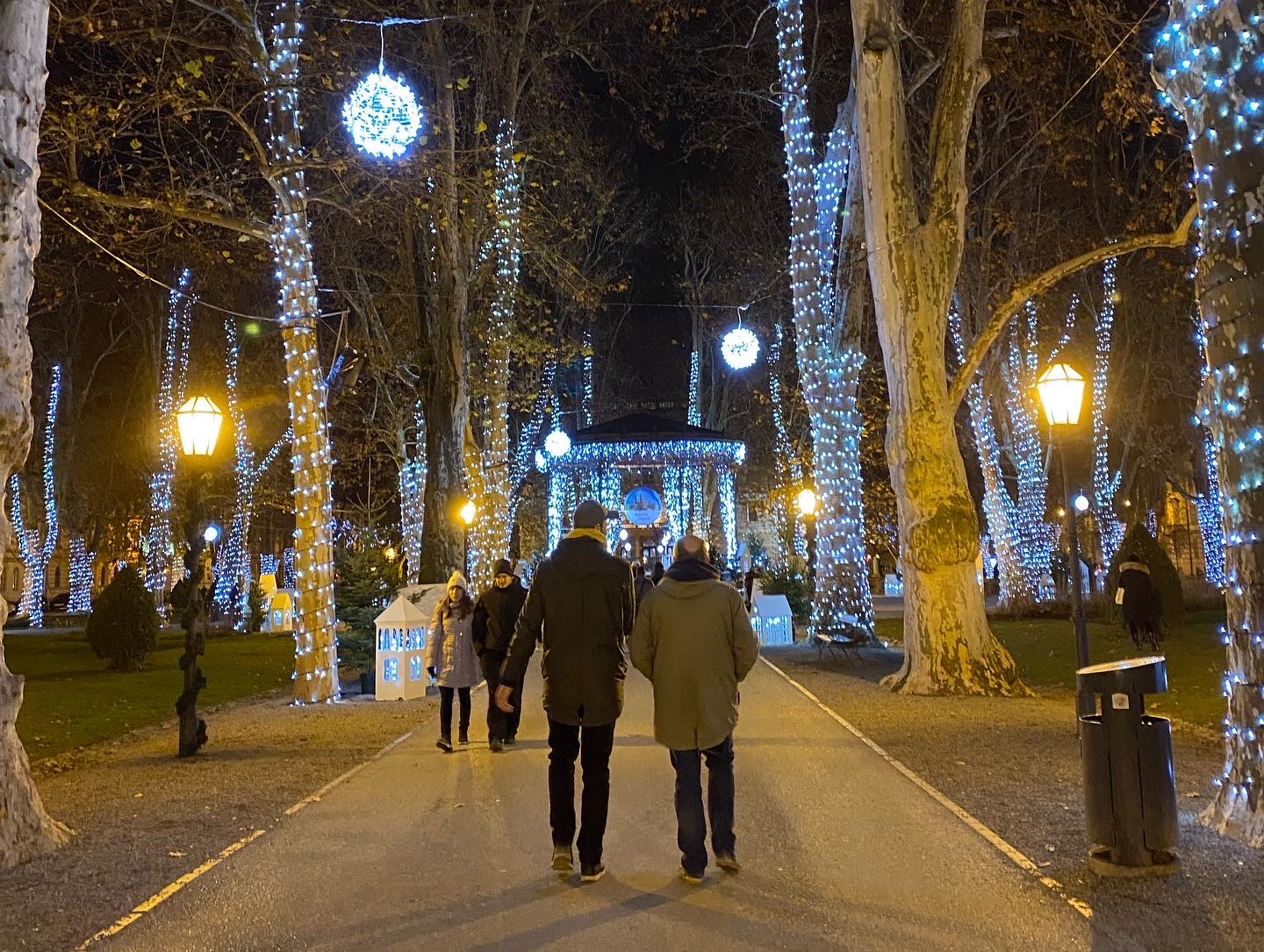Reflections on the First TCN Split Winter Tourism Roundtable
December 16, 2021 - The first TCN Split Winter Tourism Roundtable took place on Monday at CHOPS Grill in Split. Some reflections...
As I looked above the excellent steak that was served for lunch after the TCN Split Winter Tourism Roundtable, I smiled (see photo above). For opposite me, at the other side of our rectangular roundtable, were perhaps the four public officials who could have the most influence in helping the initiative to extend the Split tourist season to succeed.
And I had history with all four.
Central Dalmatia Tourist Board Director Josko Stella actually gave me my first job in 12 years back in 2013 (after more than a decade of being self-employed) when he invited me to become the official Central Dalmatian Tourist Board blogger, a position I held for 7 happy years. It is something I will always remember with gratitude.
Next to him, Mayor of Split Ivica Puljak, who I first met with his wife, MP Marijana Puljak, over a coffee in Jelsa in 2018, as they wanted to show support for me after the Mayor of Jelsa announced he was suing me (he never did). And it was Marijana who stood up in Parliament last year to raise my case of the SLAPP lawsuit by the Croatian National Tourist Board last year.
Next to him, State Secretary of the Ministry of Tourism and Sports, Tonci Glavina, a man with Klis running through his veins, whose lovely wife Tracey was the first-ever writer for TCN back in 2015.
And next to Tonci, Split Tourist Board Director Alijana Vuksic, who has been supporting firstly Total Split, and then TCN, since 2014.
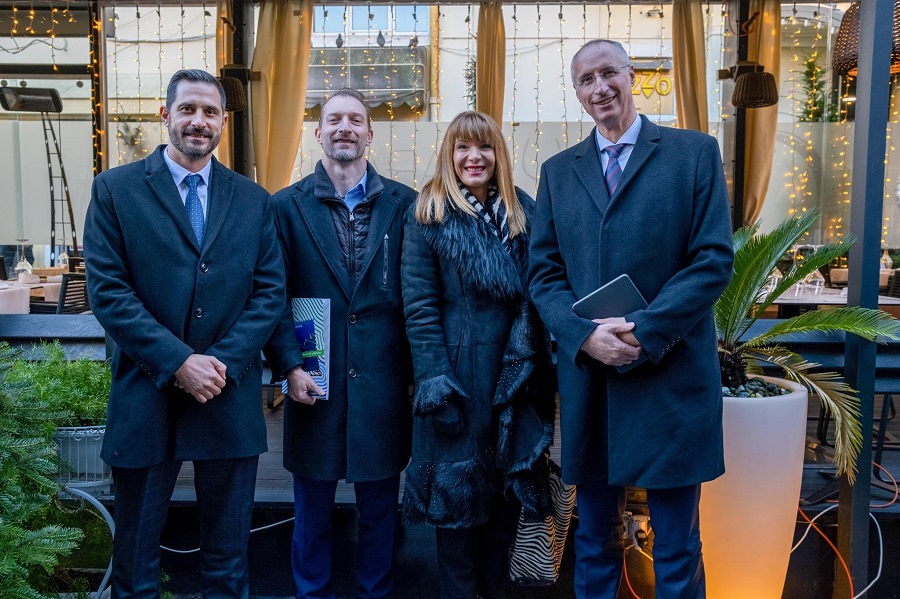
(Four key figures from the public sector - Tonci Glavina, Josko Stella, Alijana Vuksic, and Ivica Puljak)
To their left and to their right, additional figures from the public sector in the form of the Croatian Chamber of Commerce, county representative, and the Deputy Director of Split Airport, as well as some of the most important names from the private sector - GMs from 5-star hotels, tourism consultants, and representatives from the MICE, hotels, hostels and restaurant sectors.
They all came. Everyone who was invited.
And they all - without exception - left their egos and agendas at home, came to listen, then to speak, and then to engage. I won't pretend that it was straightforward to get everyone to the table, because it wasn't, but it will be a lot easier next time, because everyone left pleasantly surprised at how constructive the session was. And I think everyone left with a feeling that here was a very real chance of developing something concrete, meaningful and lasting.
While I am by no means a tourism expert, one man who is is Zoran Pejovic of Paradox Hospitality, whose contributions were poignant (and we are all very excited to learn more about the 200 million euro investment he is bringing to the Central Dalmatia region). This is what he posted on LinkedIn after our meeting:
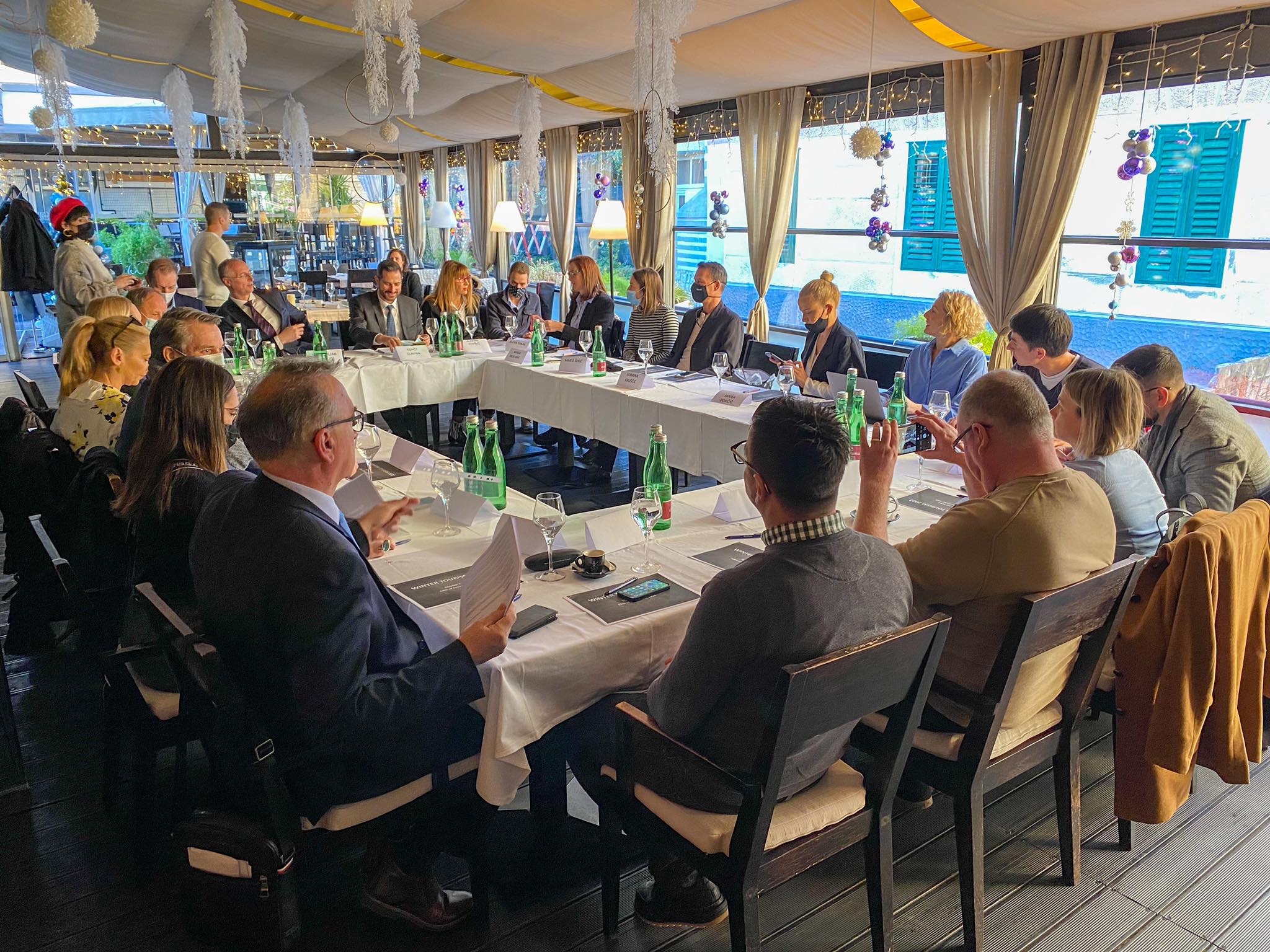
Yesterday morning I had looked at my super packed schedule for the day and for a brief moment contemplated calling Paul Bradbury to inform him that I can't make it to his "round table" discussion on the topic of Split tourism and its shoulder and off-season activities, promotions and most importantly connectivity. That would have been a mistake.
No, we didn't solve all of Split and Dalmatia's low-season tourism challenges. However, we had a very substantiated and civilized discussion with some of the stakeholders exchanging contacts for the first time and most of the participants exchanging thoughts and ideas in this format for the very first time. We had Mayor of Split, Ivica Puljak at the head of the table, together with the State Secretary in the Ministry of Tourism, Tonči Glavina. We had representatives of Split hotels, hostels, restaurants associations, DMCs as well as heads of Split Airport, Tourism Boards and Chamber of Commerce. And I was there, and I am happy to have been there.
Perhaps I had such low expectations of this round table that it was not difficult to exceed it, but this was so well organized by Paul Bradbury and Daniela Rogulj, so well moderated by Michael Freer, so well hosted by Jasmina Garbin that I have left feeling that there is yet hope for us in creating a better and more thought-through tourism in Dalmatia.
Now, a couple of comments from my side. I believe that the job of building better and more diversified tourism products and promotion of the destination rests on the shoulders of the private sector, not the public officials and the governments. That said, we need public offices to provide better infrastructure where possible and to reduce the tax burdens when possible, in order to make us more competitive with our Mediterranean competitors. Also, we all need to understand that we will not be having a lack of travellers moving forward, but the lack of workers and if this is not addressed structurally we will have nothing to discuss in the future. We need tips for the service personnel to be non-taxed until certain limits, capping it at around 700 euros a month. We finally need to start developing proper hospitality managers, from Hotel General Managers and Sales and Marketing Directors to operations executives and to make this industry desirable once again. And lastly for this post, lastly only because of LinkedIn post character limit :), we need to make a strong push for excellence and within that make no concessions on the road to more responsible hospitality and tourism.
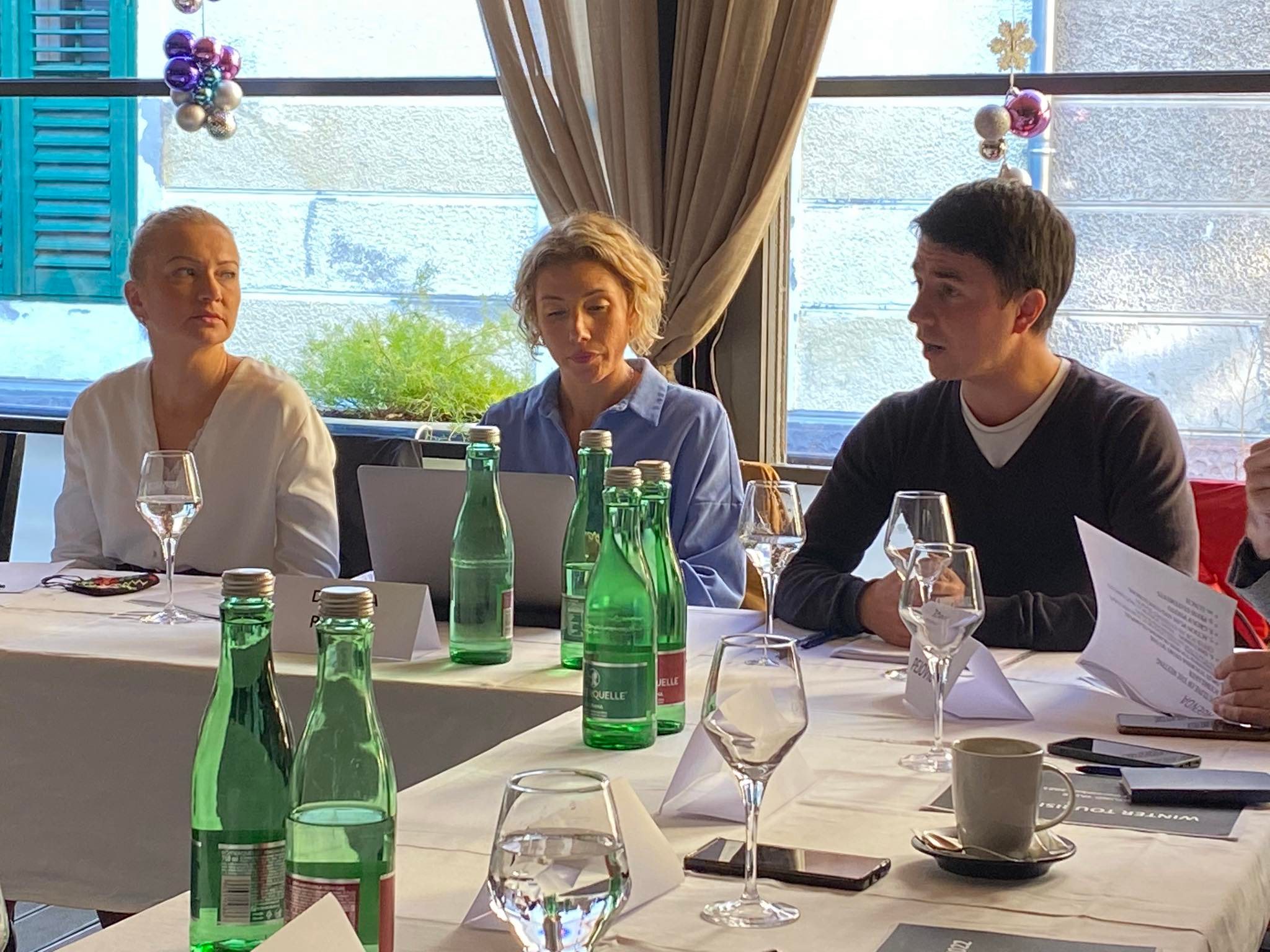
(Three stars - Jamina Kruscic, CHOPS Grill hostess, Daniela Rogulj of TCN, and moderator Michael Freer)
You can read the minutes of the meeting here, as well as the proposed action plan to get to the next level - many thanks to Daniela Rogulj for the huge amount of work that this entailed.
Here were some of my key takeaways:
1. The amount of knowledge, experience, connections, and ability in that room was frightening. As was the realisation of how disconnected it was. When Zoran casually mentioned that he was bringing 200 million euro of investment to Central Dalmatia, I smiled. It has come a few minutes after Ante Lacman bemoaned the inability of Split to heed simple requests to close a road, so that a 7-figure (euro) car launch could take place in Split. So many people dealing with so many big numbers, with no coordination with the other stakeholders. As I drove to Zadar, Zagreb and finally Osijek the next day, the very thought of being able to have a coordinated approach with all those stakeholders singing from the same hymn sheet would transform everything.
2. The engagement of Mayor Puljak and his desire to learn was impressive. It is no secret that tourism is not his strongest card, but I left with the feeling that he too wanted to unblock some of the roadblocks we are encountering.
3. The comment of consultant Mario Seric gave me additional reason to dare to dream of a good end result. Mario is a veteran of a 2008-9 initiative to bring winter flights to Split (and with some success - one of its legacies is the Split to Munich year-round flight). He agreed to give a presentation on the lessons learned from 2009 (and did so superbly), but I know that he - like Zoran - had zero expectations from the roundtable, and he was probably only there as a favour to me. Mario's conclusion that if he had had Josko, Ivica, Tonci and Alijana as the public officials to deal with back in 2009, there would probably have been a different outcome.
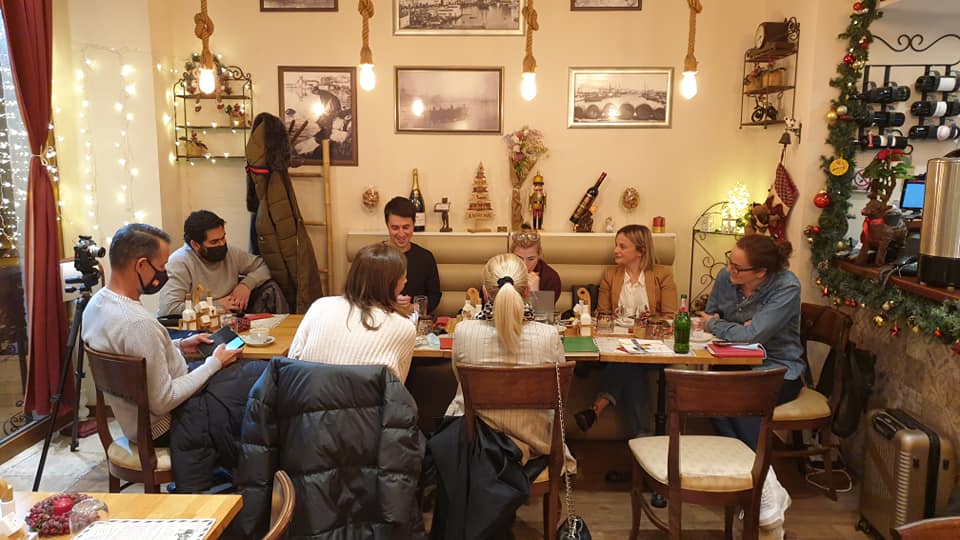
(One of the many meetings before the roundtable)
4. Pero from Split Airport was a total star, and a very transparent one. Split Airport has always been a mystery to me, and I have never met any official from there, but his openness and engagement with everyone helped to break down barriers and misconceptions, and we all left with a greater understanding of why things are the way they are, and how we can slowly effect change with a longer season of flights.
5. One thing I have learned in 2021 is that even though Croatia is a very bureaucratic country, effective public-private partnership IS possible in Croatia. Not all public institutions are as ineffective and irrelevant as the Croatian National Tourist Board, and the award-winning partnerships of Saltwater Nomads, Total Croatia News and firstly Zagreb Tourist Board, but also the City of Dubrovnik and Dubrovnik Tourist Board with Zagreb Digital Nomad Week & Ambassador Program and Dubrovnik Digital Nomads-in-Residence Program show how impactful those public-private partnerships can be when focused on a common goal. I left the roundtable with the feeling that there is now an opportunity to build on the energy of Monday's meeting to create something similar with the stakeholders from the roundtable.
6. Split, Central Dalmatia, or probably Dalmatia itself has a branding problem. Istria does things so much better, but I don't believe the core quality of the raw product is any better in Istria than in Dalmatia. Dalmatia needs to be branded properly, things need to be proactive rather than reactive. With consultants such as Mario Seric and Zoran Pejovic already stakeholders in this initiative, why not engage them to use their expertise and contacts to brand Dalmatia properly once and for all?
7. We have the right stakeholders at the table. What I really enjoyed about this whole process was seeing it come together and seeing how various stakeholders understand the limitations and possibilities of the other side. State Secretary Glavina has experience in the private sector, our charming hostess Jasmina Kruscic was once a tourist board director, and Jelena Tabak, a restaurant owner and Head of the Split Caterers Association navigates the waters expertly. So many of the stakeholders were meeting for the first time, or at least exchanging ideas for the first time. More meetings like Monday (and the next one is planned for next month) will build trust, confidence, brainstorming - and ultimately results.
8. CHOPS Grill really is the best meat restaurant in Dalmatia, and a fantastic and hospitable venue for such an event. Thank you, Jasmina, for your generous support.
Real progress was made, and I am very heartened by everything that happened on Monday. Special thanks to the incredible quartet of ladies who were the real stars of all this - Jelena from CHOPS, Mare from B7, Dani from TCN, and Jelena from Dujkin Dvor. When they put together the Wikipedia page of how Split built its winter tourism, this photo below will be the lead shot.
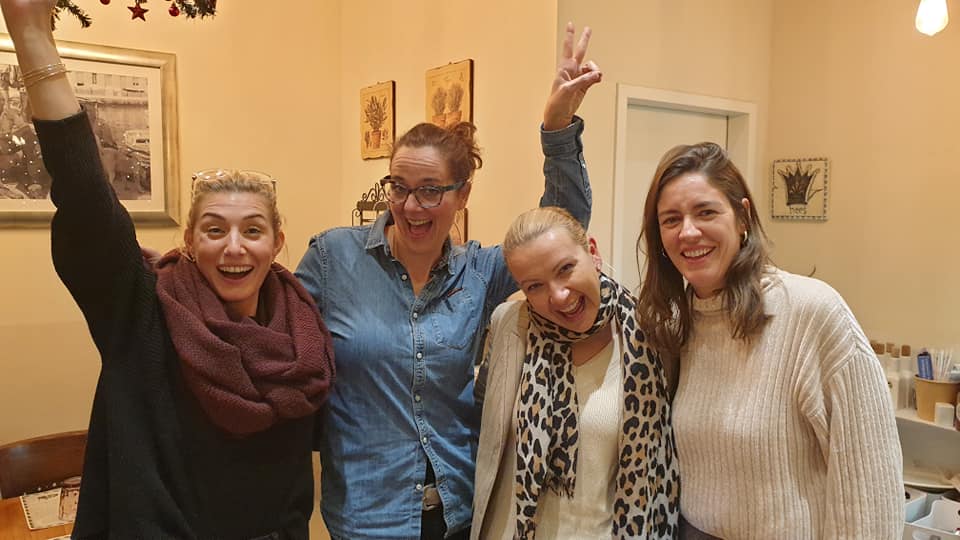
And a big thank you to Michael Freer, whose moderation and facilitation played a huge part in getting us this far. I look forward to meeting - and reporting - again next month.
To be continued...
Choosing Between Living in Zagreb or Dalmatia, Two Years Later
December 16, 2021 - After getting to know the capital of Croatia better this year, I was already imagining my life in Zagreb. However, one has to think twice before leaving Dalmatia behind so easily.
Seven months in Rijeka, and eight in Podstrana, which is located about 20 minutes south of Split. That is the time that, until March of this year, I had spent in Croatia since I arrived for the first time in October 2019. At that time I felt an urge to get to know the country beyond the coast, and Osijek was my main choice. Unfortunately, things did not work out for me to move to Slavonia, and my next destination would be Zagreb.
The impact of Zagreb on me was immediate. Parks everywhere, such a walkable city, a great public transport system, things to do everywhere and at all times, movement, life, great food... Zagreb has it all. One of the reasons why I went to Zagreb was to find a job, and this was the case in my second week there. I interpreted it as a sign to realize that my place was there, in the capital of Croatia.
A short video that I recorded and edited on the way from Split to Zagreb, with an emphasis on the landscapes between the two cities.
I would have liked to continue this article by saying that, after a few months, I managed to settle in Zagreb. But one thing led to another, and I ended up in Split after four months. Some will believe that because it was summer the decision was a bit obvious, but at some point, I really saw it possible to spend those hot months away from the coast. In July I returned to help my parents with our accommodation business during the season, and I was not yet financially ready to pay rent. In Zagreb, I was residing in student accommodation thanks to a scholarship, so that made it easy for me to live there.
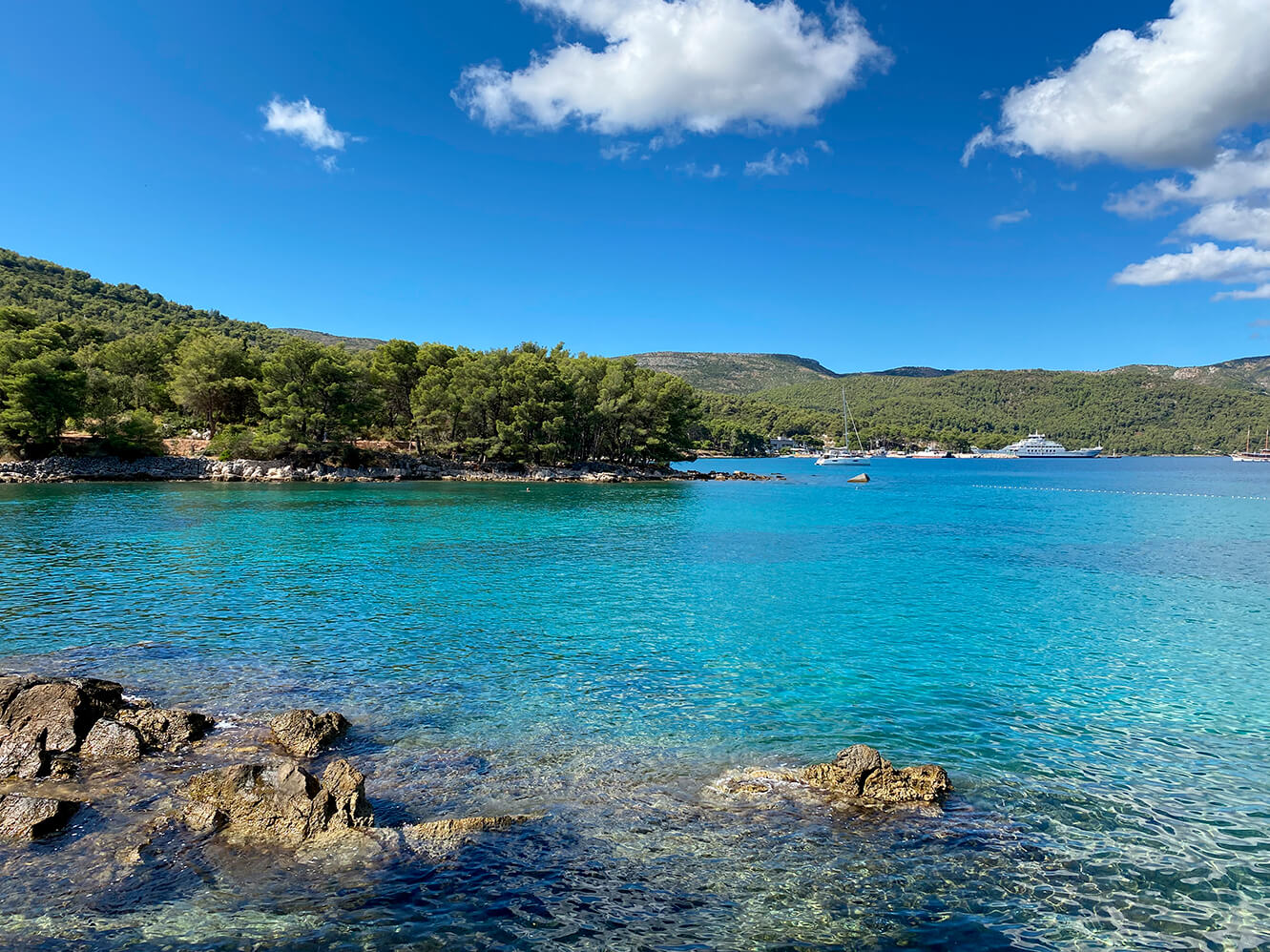
The view from Lanterna Beach, between the town and the ferry port of Stari Grad, on the island of Hvar. Heaven on earth. (Photo: Jose Alfonso Cussianovich)
I cannot say that I returned with sadness in my soul - the summer was spectacular, and for me, it is always special to be close to my family. The job I have allowed me to work in any corner of the country, so it wasn’t a big deal to move again. The reception of dozens of tourists who arrived during the season and the several beach days made summer go by very quickly for me. In the blink of an eye, it was already September. The climate in Dalmatia was the same or even more pleasant than in the previous months. I was aware that summer 2021 was slowly disappearing, but beach days, ice-cold beers, and air conditioning were still part of the routine. I still remember with great happiness the visit of my cousins, with whom we visited one of my favorite places - Stari Grad, on the island of Hvar. September was indeed a special month.
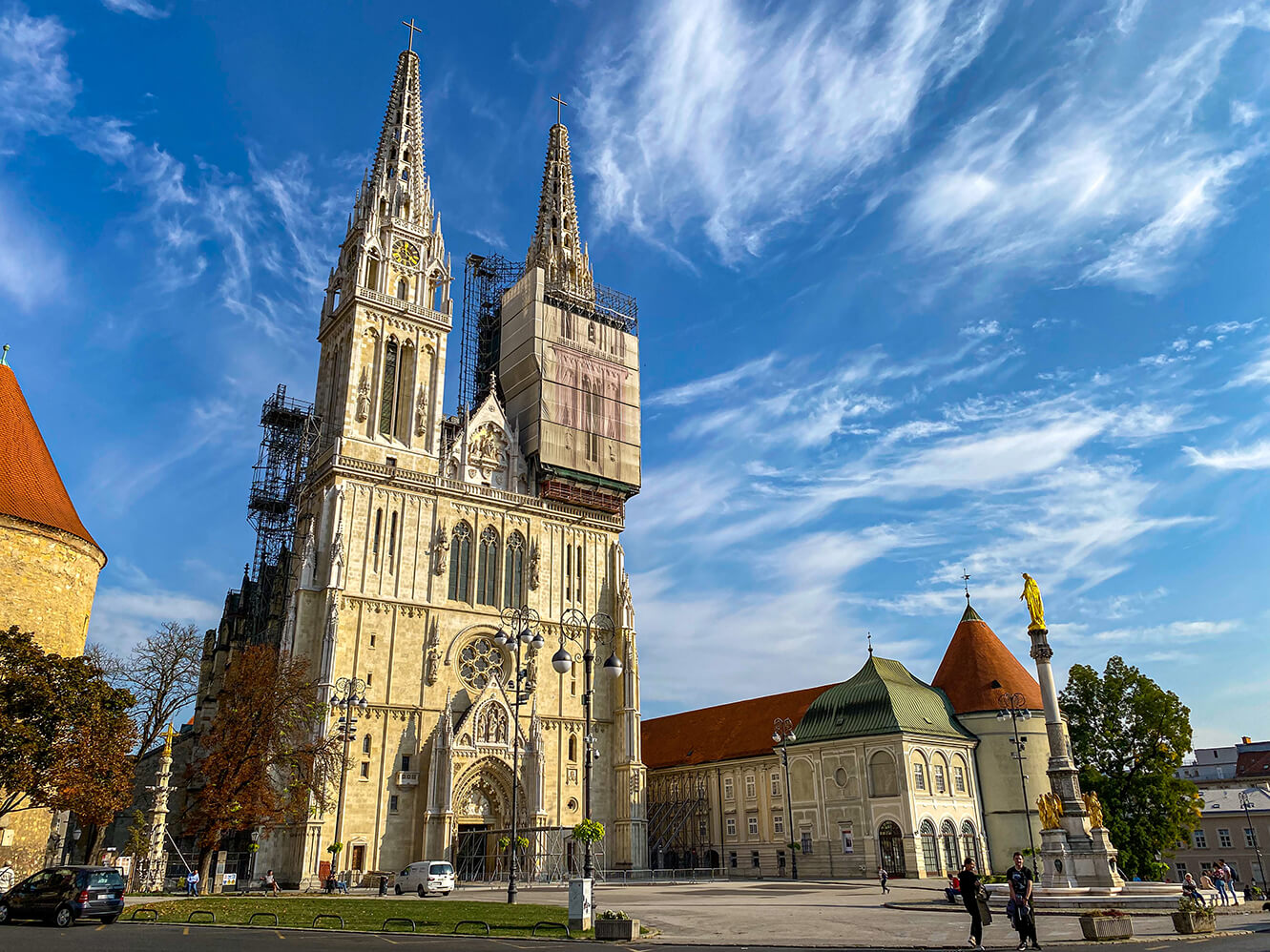
Zagreb Cathedral, when I visited the capital of Croatia in early October. (Photo: Jose Alfonso Cussianovich)
October came, and I noticed the changes when I made a short trip to Zagreb. The colors of the forests that accompany the E65 and E71 roads changed from strong green to reddish. The week I was in Zagreb, earlier that month, reminded me how much I missed the things I liked about it. That's when I said that, as a goal, I would come back at least once a month even if it's just to visit.
Shortly after that brief stay, I managed to convince my parents to go back together to spend a few days in the capital. We stayed around the corner from the Cathedral, and we really had a great time in those few days.
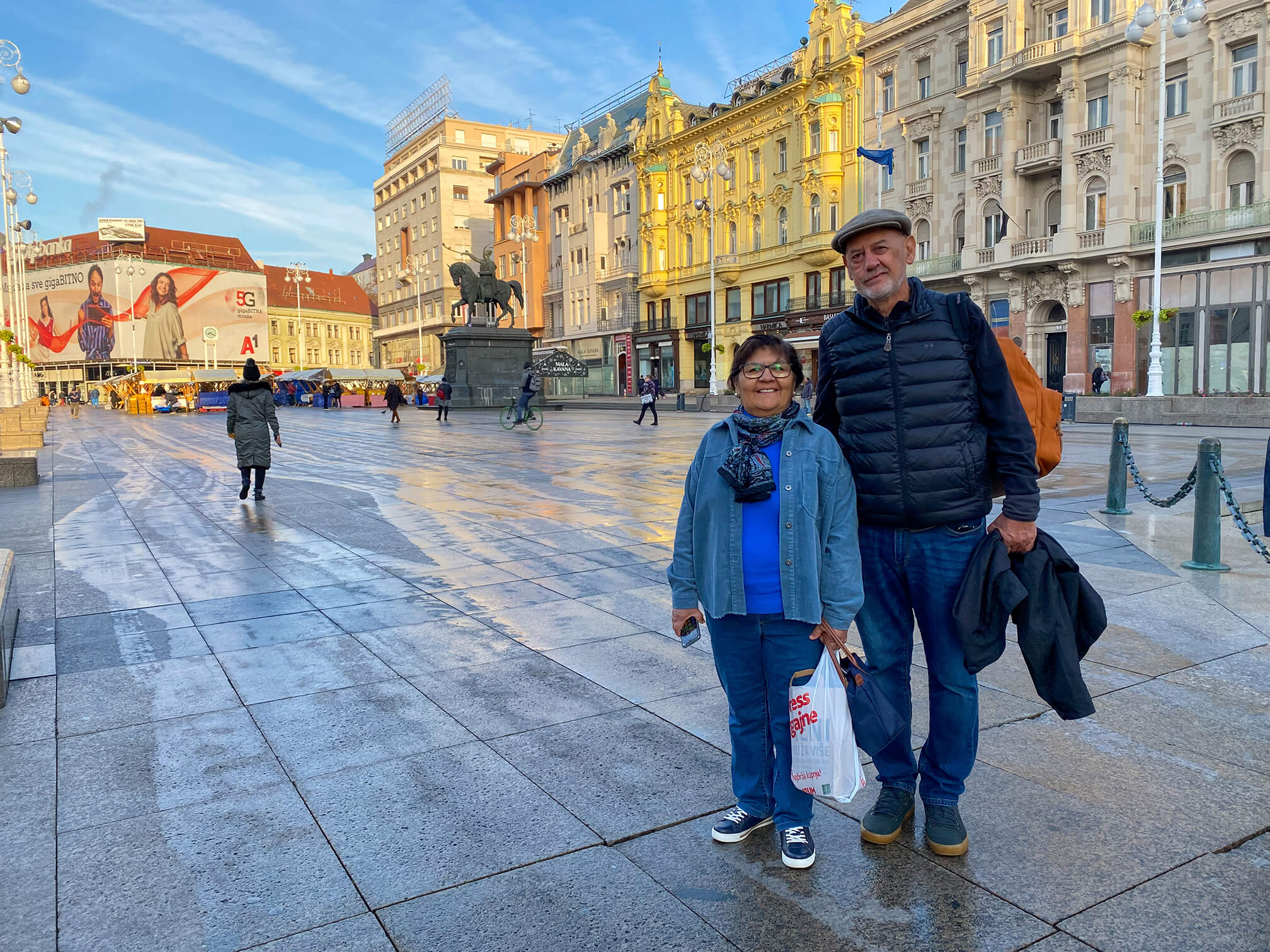
My parents, in Ban Josip Jelačić square on our little trip to Zagreb in October. (Photo: Jose Alfonso Cussianovich)
My next visit would be last week when it was time to celebrate TCN's Christmas dinner. It was the first time I went to Zagreb with a pre-winter ambiance. Despite the cold weather, I have never seen a city as lively and vibrant as Zagreb is in Advent. I kept reminding myself of the many benefits that living in Zagreb entails, which even go beyond the lifestyle, such as the efficiency of public institutions or the ease of meeting new and valuable people even in such everyday situations.
Zrinjevac Park in Zagreb, during Advent. (Photo: Jose Alfonso Cussianovich)
By then, I was already thinking about the cost of living there and it even occurred to me to try to convince my parents that living in Zagreb and running our business in Split at the same time was a very feasible alternative.
But it was time to return to Split, and in less than a week, I reconsidered everything I had been thinking throughout this year about living in Zagreb. Five things made me change my mind.
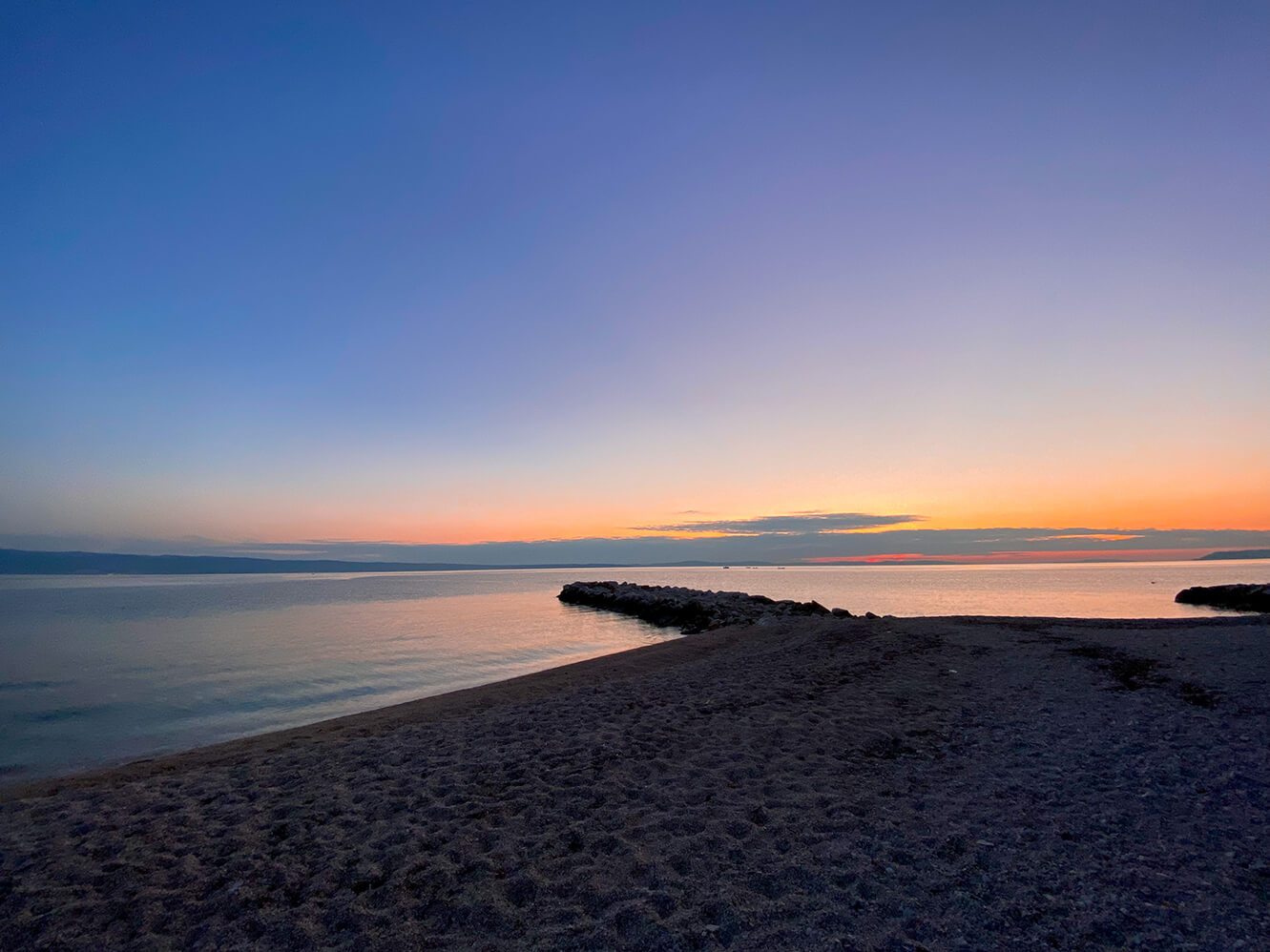
One of the many scenes that one can find when walking along the beaches of Podstrana. In this case, between sv. Martin and the Le Meridien Lav hotel. (Photo: Jose Alfonso Cussianovich)
First of all, I decided to walk along the beaches of Podstrana, from Saint Martin to the Le Meridien Lav hotel, during sunset. It is definitely not the ideal time to take a dip in the sea, but just being close to the Adriatic Sea is more than enough for me and I couldn't afford to be so far from the sea. This almost spiritual walk has been crucial for me to think things over.
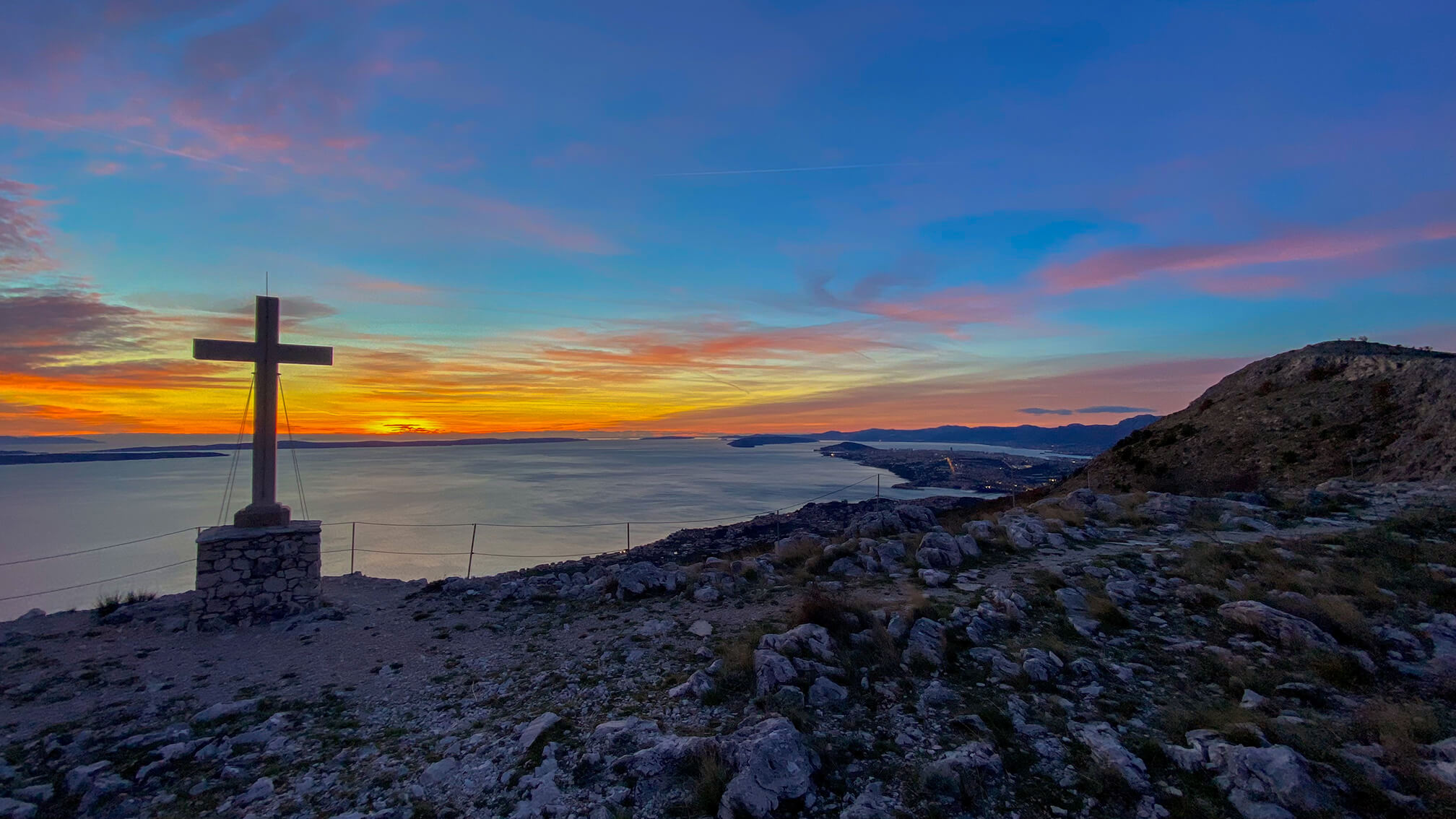
The view from the mountain, in Podstrana, next to the church of sv. Juraj. Below right, you can see the city of Split. (Photo: Jose Alfonso Cussianovich)
Secondly, the little hikes I made to the upper part of Podstrana these last two days, both on a small hill behind my house and on the mountain where the small church of St. Juraj is located. In recent weeks, gray skies, cold weather, and storms prevailed. But when I returned from Zagreb, I found sunny days, warmer weather, and stunning sunsets. The images I captured of these last two days, both in photo and video, speak for themselves. Never in my life have I witnessed such spectacular views, and that’s not an overstatement.
A short video that I recorded and edited in Podstrana, where I live, between December 14th and 15th. The sunsets were spectacular.
Third, the Split Winter Tourism roundtable. I had the great opportunity to be present at the previous meetings and at the great event held at Chops Grill on Monday. Although my role was quite minimal, the important thing for me was being able to listen to many of the people who in recent years have moved mountains to make Split a twelve-month destination and those who could finally make it happen. Self-criticism, ideas, potential collaborations, their will... all this helped me to think that the future in Split can only be better, especially if intentions and actions go hand in hand this time. It excites me to think that, with the skills and ideas that I have, I can be part of that change, in some way.
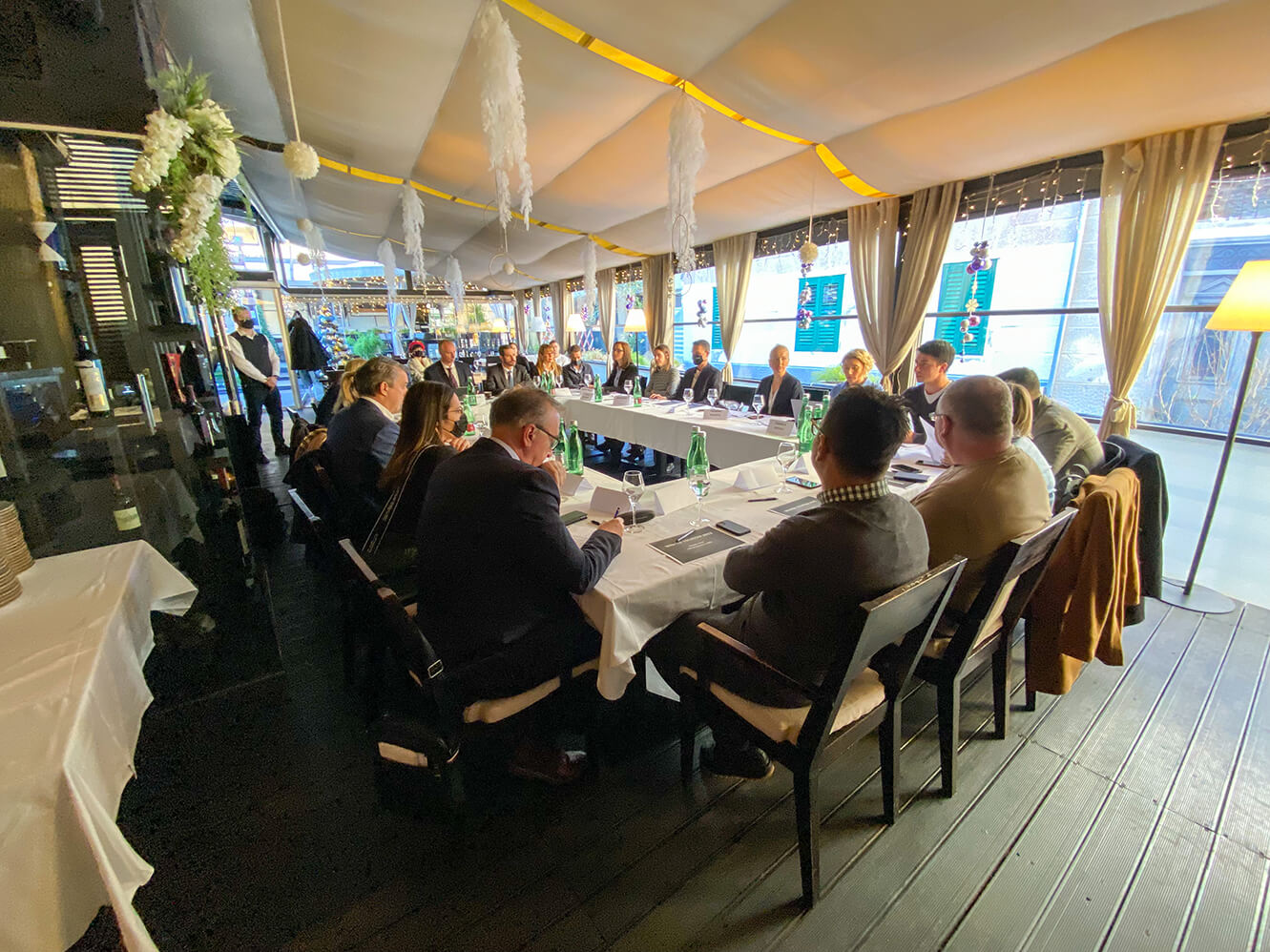
The Split Winter Tourism Roundtable, which was held at Chops Grill on Monday. (Photo: Jose Alfonso Cussianovich)
Fourth, and you probably think that I let it slip when I remembered October: the olive trees. "Who in his right mind chooses one place for another, just for the olive trees?", you might ask yourselves. It is not so much for the trees themselves, but for the experience. I was aware that the olive harvest season began in mid-October, and after missing the opportunity to see it up close at the Olive Picking Competition on the island of Brač, I decided to be more attentive to the slightest chance to live that experience.
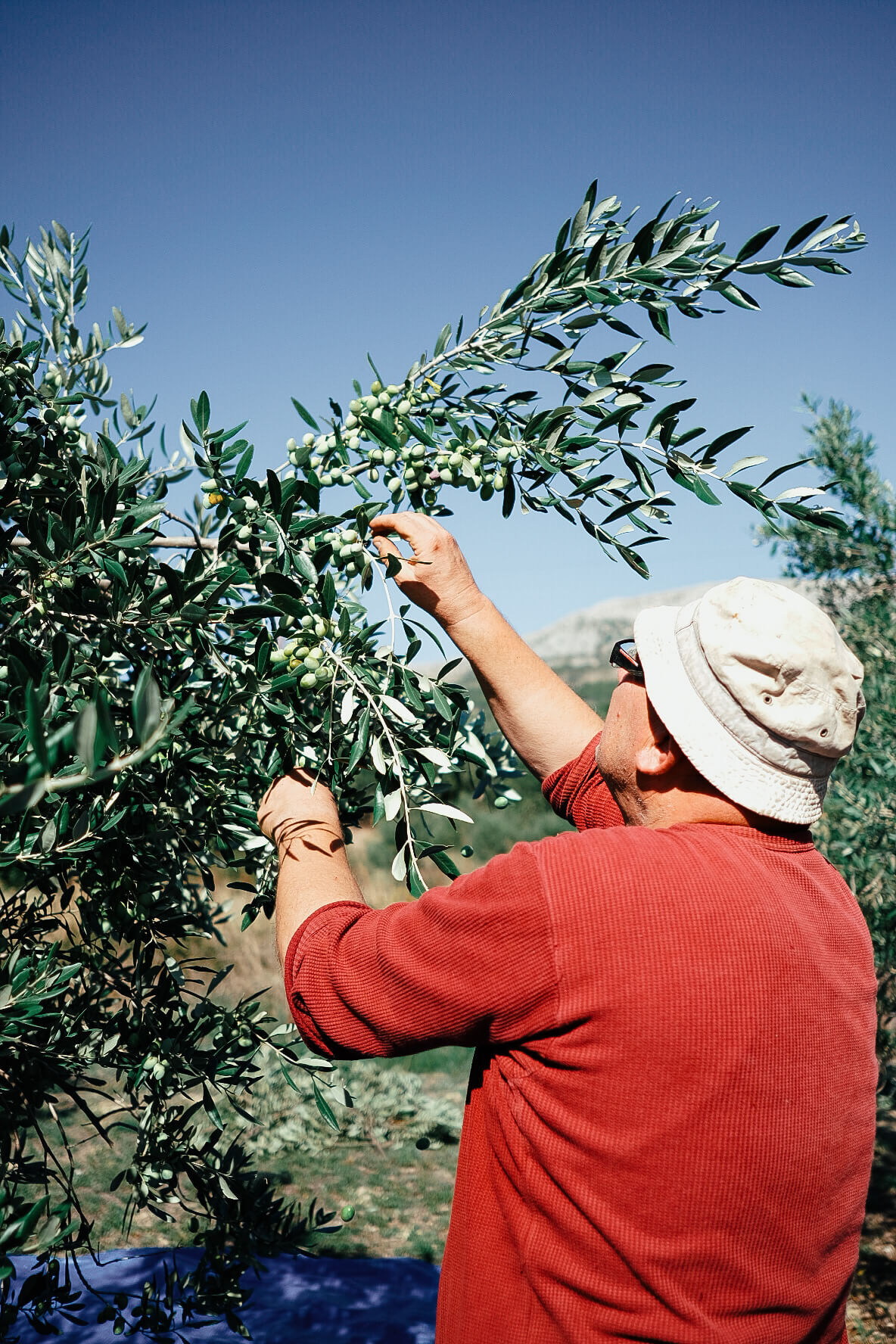
One of the photos I took while accompanying some neighbors from my neighborhood while picking olives from their trees. (Photo: Jose Alfonso Cussianovich)
Fortunately, behind the building I live in, there are many olive trees. For several days I looked to see if someone was coming to collect the olives, and indeed one day it happened. Without thinking twice, I walked there with my camera and asked a family of three if I could take some photos of them and record some videos while they picked the olives. What at first seemed like a journalistic task, turned into a very friendly afternoon in which we shared stories, and especially the father, who told me for hours everything I should know about a tradition as ancient as collecting olives. You know that as you go up the highway towards the mainland, the olive trees begin to disappear. You probably think it's a bit of a silly reason, but I just don't see myself living far from these kinds of experiences. Truth be told, one of my dreams is to have my own olive tree and make my own olive oil. So there you have it.
Last, and maybe most importantly, my Croatian ancestor, Pero Kusijanović, was born in the small district of Mokošica, in Dubrovnik and was, by all means, a true Dalmatian. Pero migrated to Peru approximately 150 years ago, and I don't think he would have ever imagined that his descendants would choose to return and settle in Zagreb, far from the Adriatic. I will honor him, in some way, trying to move my future forward here in Dalmatia.
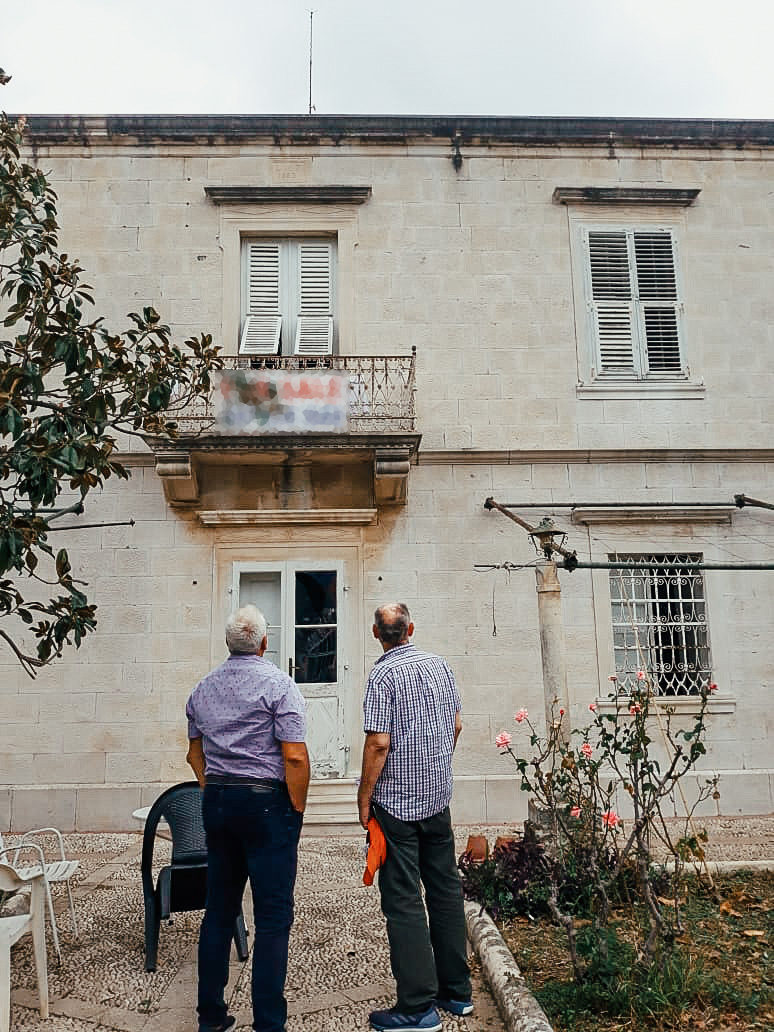
My father (right) visited the house in Mokošica, where our ancestor, Pero Kusijanović, was born and raised. (Photo: Patricia Medina)
I will never regret the experiences and moments lived anywhere other than here. If something makes a country like Croatia special, it is that each of its square kilometers has something prepared for you, and capable of marking you for life. But I do have to admit that there have been times when I underestimated the beauty of living in Dalmatia, and for that, I apologize. Sometimes you don't have to make pros and cons lists to compare one place to another. Sometimes the region has a vibe that is difficult for others to feel or understand, as the great Daniela Rogulj would say.
Many believe that Dalmatia is only the islands and the coast (which alone are good reasons to settle here), but many are unaware of the history and beauty of places Knin or Sinj, the latter I was able to visit at the end of October with my family and really blew me away.
Split, Zadar, Dubrovnik, Šibenik, Ston, Trogir, Korčula, Hvar, Knin, Sinj, Primošten, Omiš, Makarska... how can you forget about these places and many others with such ease? Sometimes it is about what a place already is, and sometimes what a place can become. For the moment, I choose the latter. There’s so much for me to discover here before jumping to conclusions, or Zagreb.
For more, check out our dedicated travel section.
Split Winter Tourism Roundtable Meeting Minutes & Action Plan
December 16, 2021 - The first Split Winter Tourism Roundtable took place at CHOPS Grill in Split on Monday - a transparent publication of the meeting minutes and action plan.
I had no idea what to expect from the TCN Split Winter Tourism Roundtable initiative, but I certainly did not expect it to be as productive as it was on Monday, or to have so much engagement from everyone present and a collective willingness to try and move things to the next stage.
I will be publishing my own reflections on morning (and afternoon) of high energy, positive vibes, and an excellent extended lunch by CHOPS Grill, our very generous hosts for the roundtable. But for now, as promised, the minutes from the meeting and proposed action plan to get to the next stage.
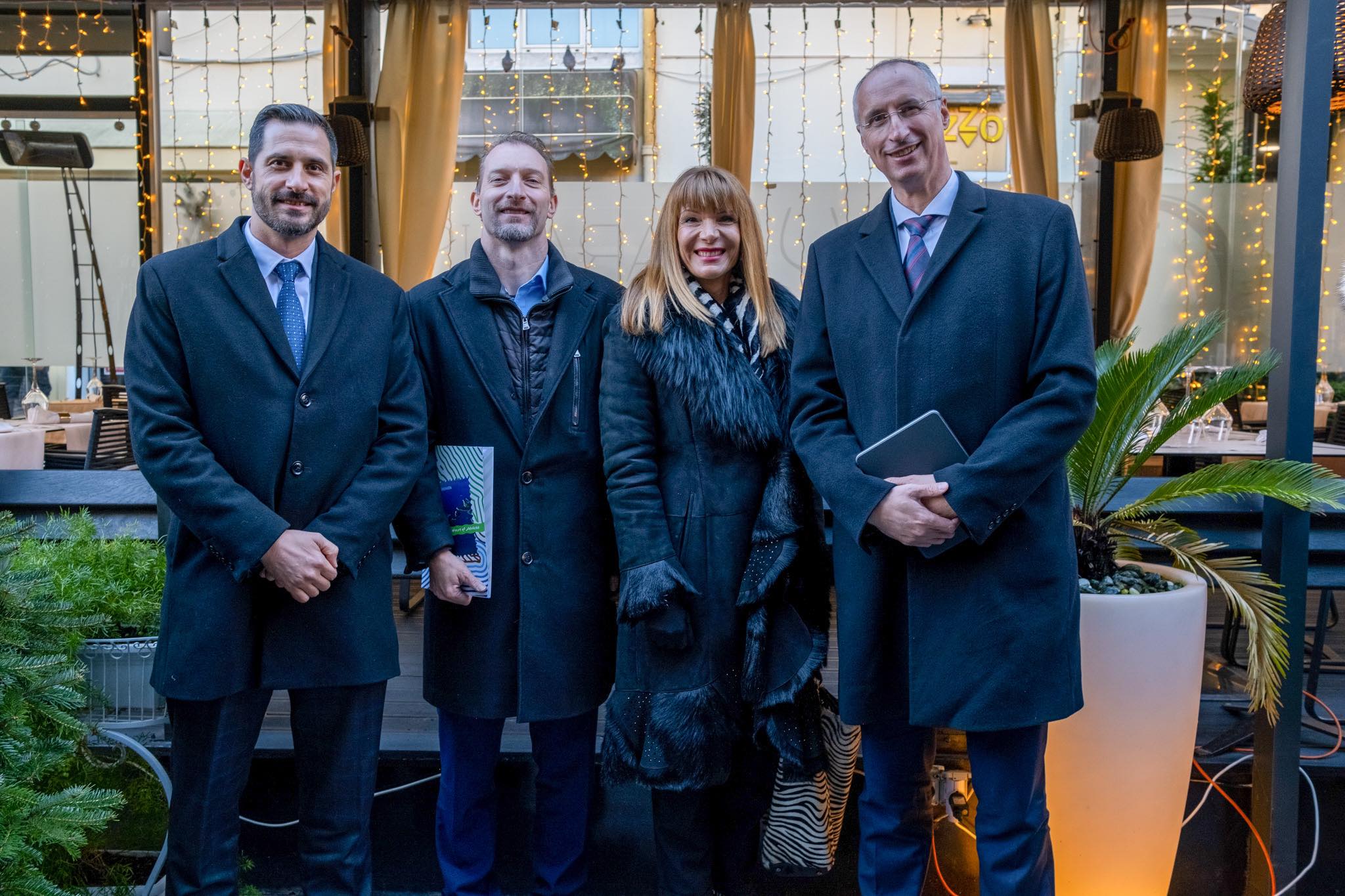
Date: December 13, 2021
Host: Jasmina Krušić and Chops Grill Steak & Seafood
Organisers: Total Croatia News (CEO Paul Bradbury & COO Daniela Rogulj), Maria Mustapić (Brasserie on 7, Zinfandel Food & Wine Bar, Charlies Bar, Split hostels), Jelena Tabak (Dujkin Dvor, Split Association of Caterers), Jasmina Krušić (Chops Grill Steak & Seafood)
Moderator: Michael Freer
Attended by: Ivica Puljak, Mayor of Split, Tonči Glavina, State Secretary of the Ministry of Tourism, Alijana Vukšić, Director of Split Tourist Board, Joško Stella, Director of Split-Dalmatia County Tourist Board, Pero Bilas, Deputy Director of Split Airport, Joze Tomaš, President Split-Dalmatia County Chamber of Economy, Nataša Bušić, Secretary of the County Chamber for Tourism, Paul Bradbury, journalist and CEO of Total Croatia News, representatives of hotels (Nevena Antonini - Radisson Blu Split, Arnoud Zaalberg and Andrijana Mladina (Le Meridien Lav), Zoran Pejović (Paradox Hospitality), Marija Mustapić (Split hostels), Jelena Tabak (Split Association of Caterers), Ante Lacman (Intours MICE), Ivana Durdov (Secret Dalmatia), Chops Grill owner and host Jasmina Kruščić, and TCN minute taker Daniela Rogulj.
*The meeting was attended by a mix of the private, public, and charity sectors.
How can we improve everyone’s life in Split? Dalmatia? Croatia?
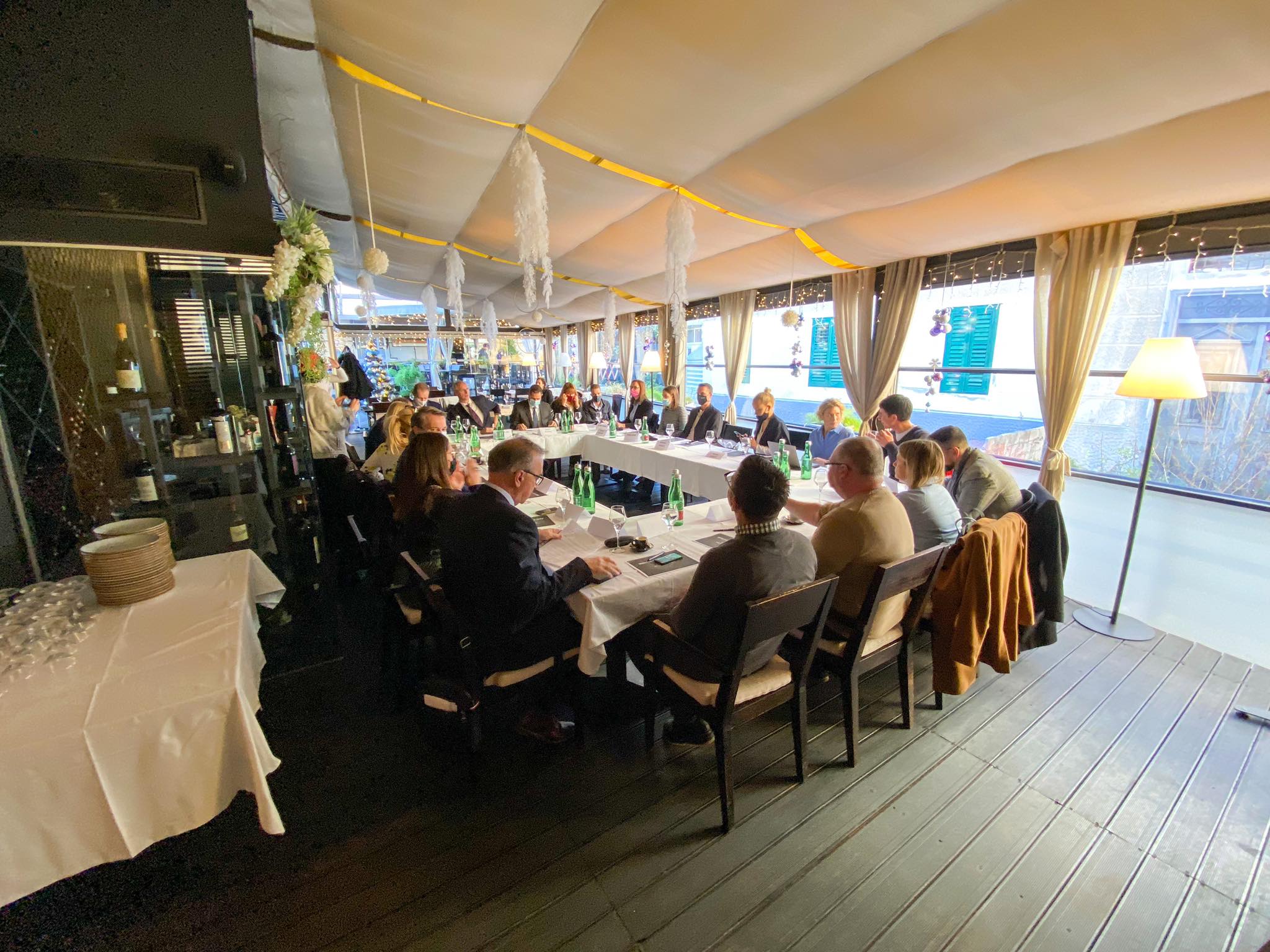
Split Winter Tourism Roundtable Goal: To come up with ways forward; get everyone on the same page; give our own opinions and ideas.
Icebreaker
What does Split already have for tourists in November? | What is Split missing in November?
What do we have?
Good weather
Comments:
*Bura in November - yearly statistical averages show that Split has the worst weather in the Mediterranean in terms of rainy days. Compared with other Mediterranean cities, this could raise an issue for Split as a city break destination.
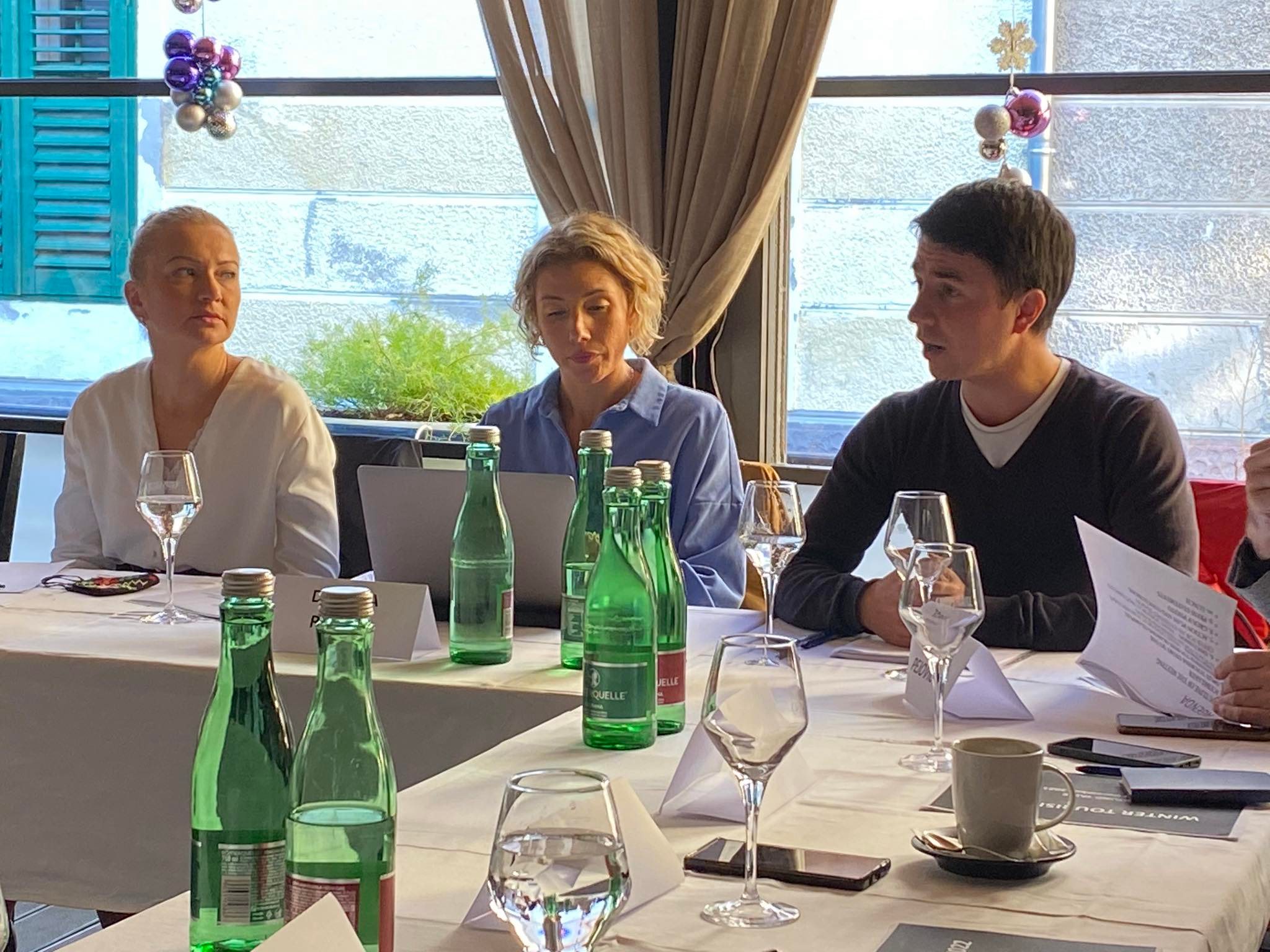
Active tourism
Comments:
*Olive picking, bike tours, hiking.
*HGK has 10 tourism clusters, from active tourism to hotels. Congresses are held to bring together people who offer active tourism and accommodations, with activities for ages 7-77.
*HGK also has a cultural association and a diving association, all to extend the season and look past the sun and sea.
*Winter sailing potential - totally different experience.
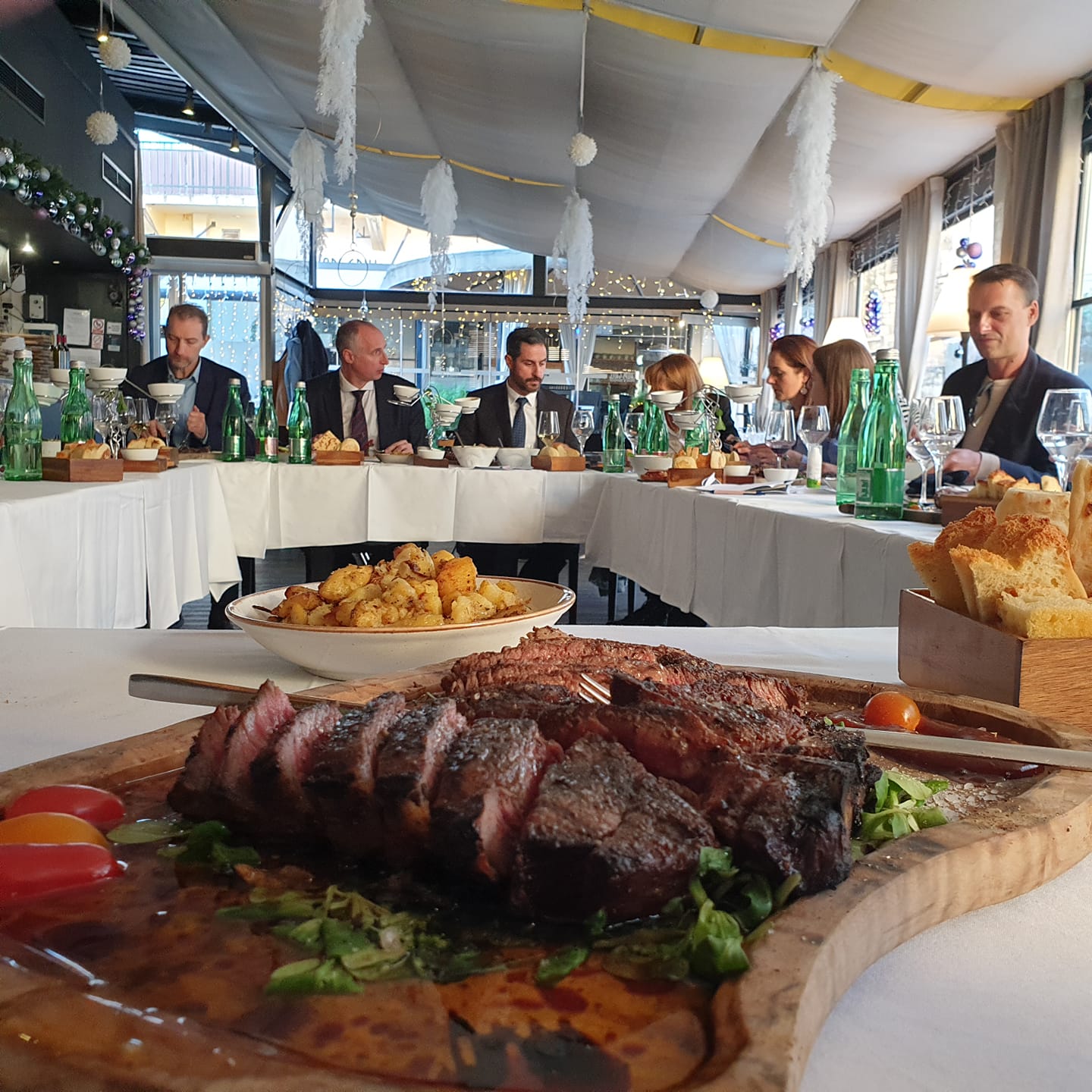
Gastronomy
Comments:
*Jelena Tabak of the Split Caterers Association spoke about how the Split offer has changed in the last 5 years to become a culinary centre of Croatia, with a better offer than Zagreb. Restaurants are the last part of the land-service offer chain. Gastronomy is very important and caterers are struggling to get locals back in town (they are going to shopping malls instead). Caterers trying to create a local offer, because without locals, there are no tourists.
*Gastro festivals in November won’t be possible if terrace prices increase in town. Caterers are waiting for a new strategy, otherwise restaurants will be forced to operate seasonally (it would be the responsible thing for restaurants to do). Caterers need to know the strategy (if terrace price increase, it will destroy the fight they have won so far)
*November is wine month - keep in mind for future events.
*Arnoud Zaalberg has been in Split for 11 years. The restaurant offer has changed from catering to the masses to adapting to new flavours.
*Need to work on sustainability - see what is around us in Dalmatia, what we have/have lost over the years. People don’t want to work in fields as they aren’t supported. Restaurants need to work with local OPGs, as there are many great things around Dalmatia to help the culinary tourist offer.
*Istria is doing a much better job than Split, but the restaurant sector is going in the right direction.
*Zoran Pejović added that gastronomy is not where it should be. While it is better than it was, and miles have been crossed, there is a difference in what you can get and how people perceive Split gastronomy abroad.
*Split is not a gastronomic destination - internationally people don't know what Split has. Split needs to find a new narrative/storyline to make the city distinct.
*Slovenia is doing an amazing job thanks to one female chef - Ana Roš - who is single-handedly putting Slovenia on the world map. Croatia needs to find their Ana.
*Split needs to create responsible activities. Our wine and olive oil are on par with the rest of the world, but there is no good package, no good narrative. We need to find ambassadors.
Split vs. Dubrovnik | Car Launches
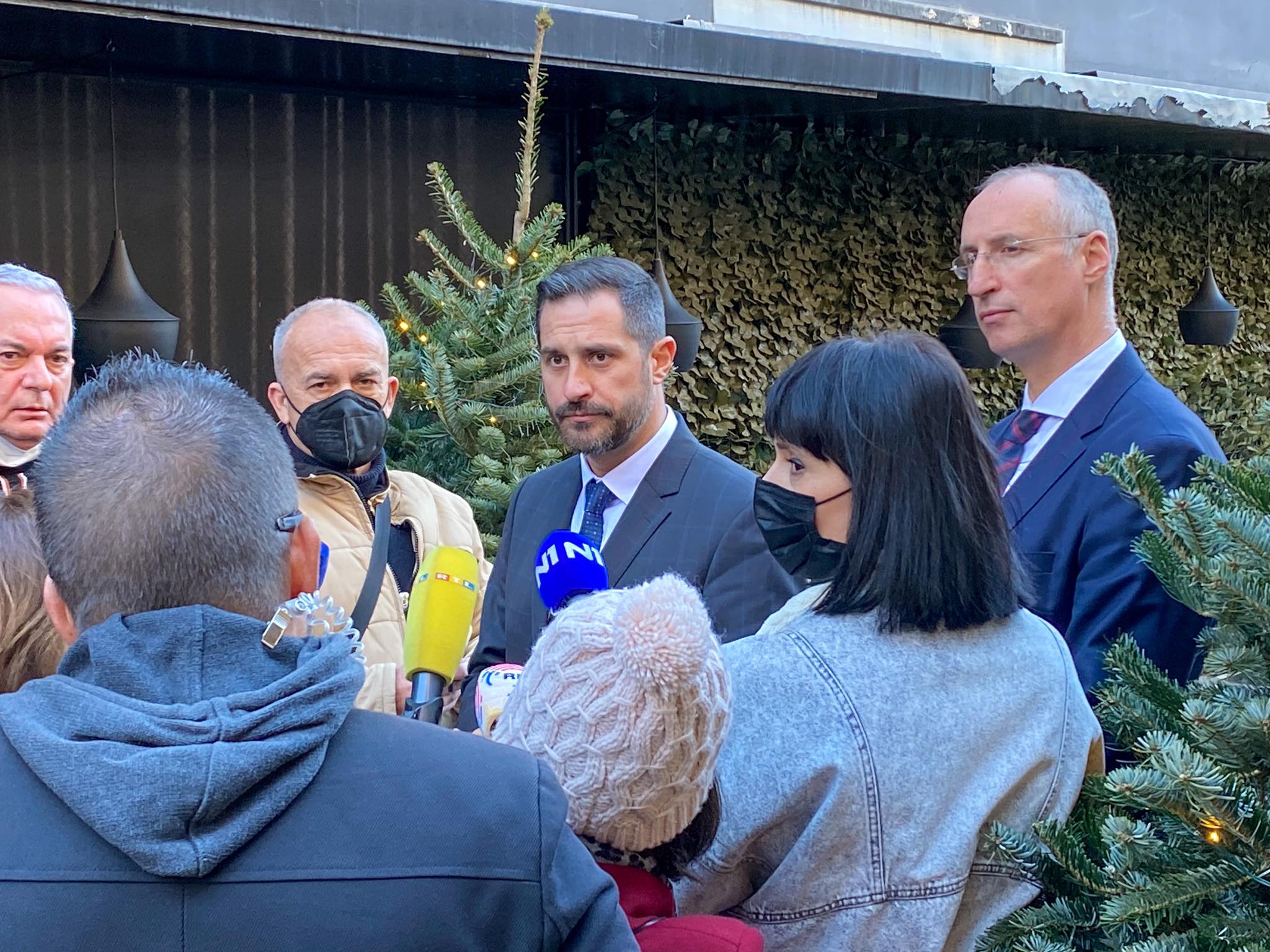
Comments:
*Split needs to develop a long-term plan so we don’t turn into Dubrovnik.
*Andrijana Mladina believes Split needs to be more attractive with a lot more elements.
*The season in Dubrovnik is longer than in Split as they have a filming industry, car launches, hotels, and DMCs.
*Ante Lacman believes Split needs to be more flexible; be a partner instead of an enemy.
*Intours is the regional leader in the MICE segment. There is an interest in car launches focused on the pre and post-season, but the issue is connectivity.
*100 requests for car launch events - people are bored of the usual locations - Split could receive at least 1 million euro - they are always held in the offseason - big car names - but they fail due to the flight connections.
Accommodation
*Arnoud added that Split is missing 2-3k beds year-round. Split cannot compete with Malta in this segment - need 5-6 bigger hotels with 250 - 300 keys - and a convention centre to extend the season.
*Split has no real international hotels - why is everything opening in Montenegro? Because foreign investment is too difficult here.
*Zoran - Do we have empty beds? Yes. Do we have hotels? No. Hotels in Montenegro are there for both good and bad reasons. Split lacks hotels that will further the image of the destination. No hotels in Dubrovnik have helped to further international image - and Split is millennia behind.
*Split needs hotels that will help position the city on the market / add convention centers. 6-8 room hotels do not help the image of the destination.
*Andrijana believes Dubrovnik tourism was lucky with misfortune. Split took a long time to become ‘a destination’. Le Meridien helped make Split a destination.
Is there a city break offer?
*If we have flights, we need experiences - hiking and kayaking are questionable due to weather. The Palace has potential for events in the basement (or indoor events)
*November offer needs to be much better for people to visit, but we need to focus on the region first.
*Split is the only big city where the population is declining - no local life to give to travellers - empty old town - need events.
*Only bars and restaurants in the centre - we need to be a reason to get people into the centre- during the week there is nothing to do.
*Shopping is awful - no big or designer brands.
*Need to focus on the local market - ned to attract locals to Split in November.
*City break - 4 day work weeks? Need content for a 3-day weekends.
*Exhibitions
*4 UNESCO protected sites - big on the cultural map - small galleries - really talented people - private initiatives alongside with UNESCO - not explored enough in the offer
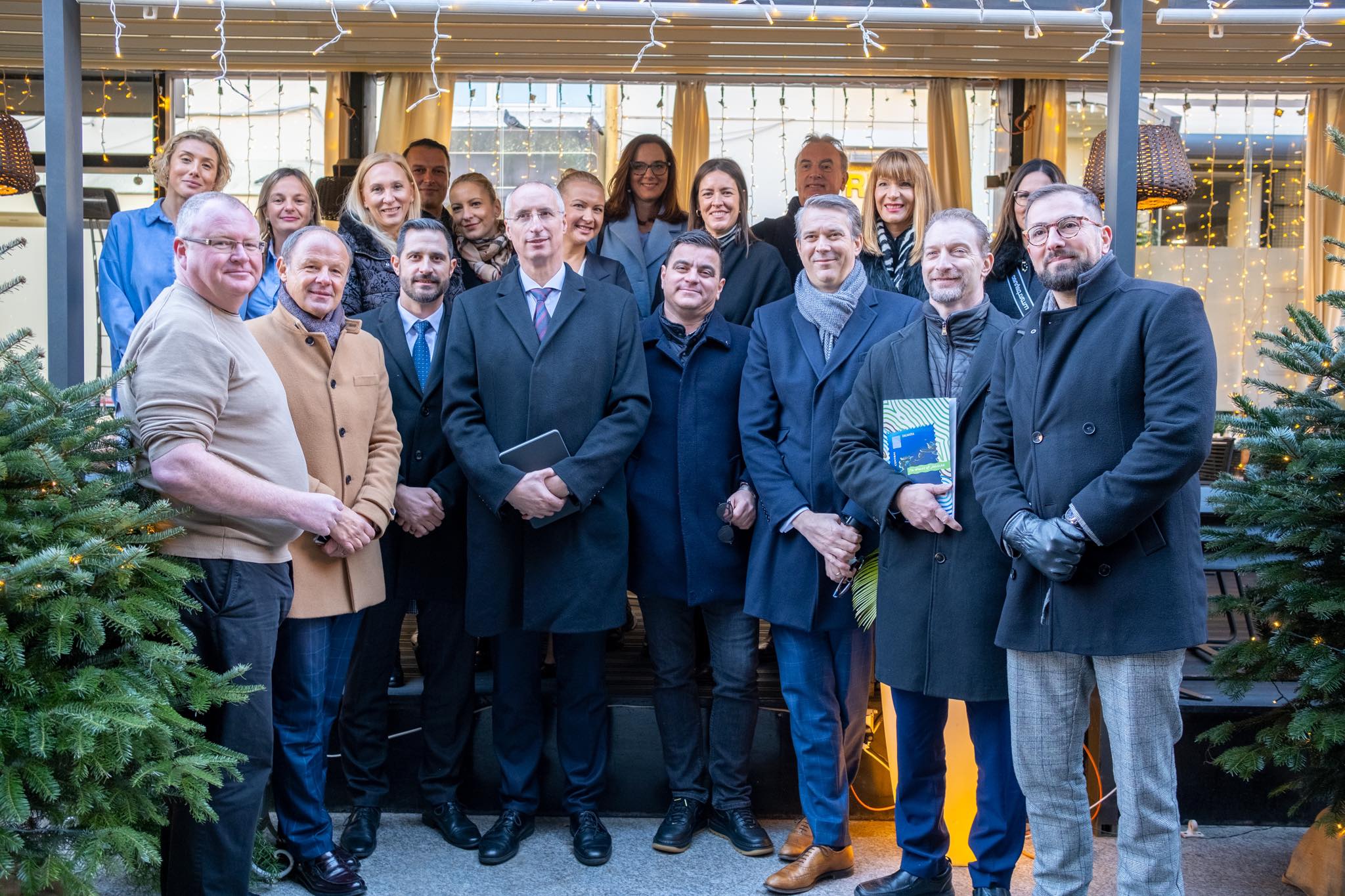
What do we need?
FLIGHTS
*Pero Bilas said the good news is summer, the bad news is winter.
*This can be seen thanks to the figures - capacity fulfilled in the peak season - then it starts spreading into other months - but there is nothing in March if you don’t fulfil April, and so on.
*Need to focus on November tourism, not January tourism.
*Extend flights for the first 12 days of November. Fulfiling November is a way we can continue.
*55 airlines for summer 2022 at the moment, which is comparable to 2019 (dependent on the pandemic). 5 million seats and more than 2 million passengers are expected in the 2022 season.
*No available slots in the summer.
*Airlines slightly extend their schedule into November.
*This week - 55 flights total - load factor 47% - achieving 70% would be great. Example - 55 flights - 5,5000 seats one way (11,000 weekly). During the peak season, we have 120 flights.
*In comparison this week, Dubrovnik has 27 flights, Tivat 34 flights, Zadar 6 flights.
*Can you negotiate with airlines on conditions? In aviation there is only summer/winter - Split Airport cannot make it conditional due to the IATA scheduling and Split Airport policy.
*Split Airport policy on subsidised flights? Can we agree with Ryanair? Split has had several discussions with Ryanair - equal conditions for everyone. Ryanair requests more than anyone else - Split Airport can’t jeopardise other airlines. Ryanair already flies to Split all the time, no need for a base.
*Can there be a call to action for winter slots? Hotels are flexible in the winter, why can’t airports be? Can the airport have similar actions?
*Are landing rights the same in summer and winter? Can we make an incentive for winter time (passenger service drop down of 5 euro)?
*Split Airport pricing - honest figures.
*Ryanair in Zagreb offers special discounts - big question mark on how.
*Split Airport reached Zagreb traffic - 3.3 million passengers in 2019.
*Typical winter month at Split Airport is 30k passengers - that is a single Saturday in the peak season.
*What is at Split Airport’s disposal to attract flights? Subsidies to promote the pre and post-season.
*If two companies want slots in the season - how do you choose? Is it possible to offer a slot in the offseason if all slots are taken in the summer? Answer - everyone wants a summer slot.
*No one will come to Split for a city break if they have to pay 500 euros for a flight.
*New cities - need to think about locals as well - need cities locals want to visit.
*Tonci Glavina - in 2017, the ministry started a subsidy flights program - invested 70 million kuna (10 million euros)
- all charter airlines/land tour operators
- 259 new flights in Croatia
- great success
- 10 million sounds like a lot of money but it is peanuts
- several meetings with tour operators - Ryanair most - they’re in the business to make money
- if they have low capacity, they won’t make money
- Chicken and egg again - motives for arrivals to the destination - what will motivate guests to buy tickets? Ryanair flies to Split for free.
Branding as Dalmatia
*Tonci Glavina on Split winter tourism - to brand Split as a year-round destination, we need to brand Dalmatia.
*All the main tourism products we offer cannot be had by themselves - Split will always be the centre but without Dalmatia it is nothing.
*In order for year-round tourism we need other products
*Private and public sectors need to brand the image better - does Istria have better olive oil or wine? No, but better banding.
*We need to brand Dalmatia a destination and create motives for arrival.
*Flights - first direct flight from the US to Dubrovnik 3 years ago - Ministry invested huge political capital, no subsidies
*American airlines - huge campaign in the States - United and Delta followed
*The government can help Split Airport
*Joško Stella - we have 3 institutions doing the same thing - the season has extended in the last 5 years
*To extend the shoulder season, we need to go stronger into November
*Tourist boards have a big capacity (funds)
*Eurowings, Jet 2, easyjet, etc have the most flights in the most critical months, but everyone wants the same thing - more slots in summer
*What is Split’s advantage? 55 airlines - if someone drops out, we don’t have a problem
*We need to incorporate everything when looking at extending the season. Everyone needs to get involved.
*Tourist Boards will subsidise events - 100k euros last year - especially pre and post-season activities
*Conclusion from Split Tourist Board - we need to all work together - that is extremely important. We have prepared many events - working on ‘Gastronomy Month’ in November.
Next Steps
FUNDING
*Only two people at the meeting had funding so far from Tourist Boards. Suggestion - funding session with Stella, Puljak, and Vukšić to look at branding and budgets.
*Mayor Puljak - we need an even larger strategy - need Split to become an international city - 20-30% of foreigners will make it an international city
*Ideas - Gastronomy month (October or November) - Month of Music - need to target a month that is outside the season (June or May)
*Gastronomy action group - marketing, prices, looking at other examples - Split Tourist Board, City of Split, Split-Dalmatia County all need to work together
*Missing a branding strategy for Dalmatia and Split
*The good news is that we don’t have a brand established yet
Airport strategy
*How will we fill April and October and grow as well? Tourist experts should lead, but the airport will take part (with Split and SD County)
*Who directly works with the airports in the Tourist Boards?
*Need to create the product, not invest in flights
*Split Tourist Board creating dozens of products every year, cooperating in education and events
How can the private sector be more involved on a regular basis to speak the same narrative?
*Through HGK - they are the link - they are a hub to connect
*They act upon a problem
*Need better cooperation
*Meetings are held to put out fires but not to plan
Tonči Glavina - are we reaching the wrong conclusion?
*2 years ago the Ministry introduced a new tourism reform system.
*Tourist Board infrastructure - if it is run properly, it is headed by the mayor, with the Tourism Council headed by the Prefect.
*Members of Tourist Boards in Split and SD County are companies that pay membership fees.
*There is an annual meeting with the council - headed by Mayor or Prefect - to make decisions for the destination.
*Reorganizing the system gave more power to local tourist boards - regional tourist boards received more money.
*Tourism policies are created here/executed here - needs to be done through the local government.
*HGK - part of destination management - needs to be involved as well.
*All synchronization needs to happen through these bodies - leadership needs to be involved
*It is already set up - we just need to do better.
How?
*We have the products, we need to do a better job.
*Hotel Marjan revamp with bring MICE capacity.
*Tonči Glavina is optimistic.
*We do not need to create new products, but make the ones we have better and brand them better.
*Need to talk about extending the shoulder and preseason - not the winter (think about autumn and spring)
Recap - final comments by participants
Joško Stella: Next step will be to meet with the tourist council. We need to consider the entire region and what is best for the region. He will invite cooperation with HGK and other representatives to reveal the details of financial possibilities. We need to inform people about these possibilities.
Ivica Puljak: We have the system set up, but need to make it better. We are all represented already. Puljak is very willing to do it; excited to consume the opportunity. Build the brand of Dalmatia. Split-Dalmatia County is not recognisable.
Tonči Glavina: Split is the heart of Dalmatia - Dalmatia is the brand. 2,000 guests in the County right now, all 2,000 in Split. The government will support activities at the regional and local level - co-financing programs, etc. 2.2 billion kuna in EU funds coming to the Croatian tourism sector by next summer. They need to allocate funds for 2021-2027. They are working on a sustainable tourism strategy for the next 10 years - can help through the system.
Alijana Vukšić: Better cooperation. We have to think together, we have time. We have everyone here, and many chances to work together.
Jelena Tabak: We will continue to cooperate with the city; hopefully the terrace prices go down. Caterers will fight to keep things open in November.
Maria Mustapić: We need to think about a plan and strategy to make Dalmatia more recognisable.
Jasmina Krušić: We will continue working at Chops so that there are excellent offers for locals and tourists. We will work with Jelena and the Tourist Board to create a good plan for November. We need admin help with investments and events - this process is slowing us down.
Zoran Pejović: 200 million euro of investment in Split-Dalmatia County coming. The private sector needs to be the driving force. The government needs to help by lowering taxes. Allow tips to be non-taxable. We will have guests but no employees. We need to commission new research to know how many tourists come by car, plane, how markets see Split. We need global research, then work on a strategy together.
Ivana Durdov: We are lacking products and need to work together to create the product. We have a lack of promotion. We invest a lot in marketing in general but not really promoting our services. We will promote Dalmatia as a brand through our channels (luxury tourism in the American market - travel in the offseason).
Paul Bradbury: We have a world-class offer 12 months a year - but are bad at telling people. Using video content through the eyes of digital nomads year-round is the way. We are developing a platform of authentic experiences all over the country to show there is life everywhere through digital nomads and remote working. Cromads is a great platform to move Croatia forward. I will ask for meetings with Stella, Brnjac, and others.
Ante Lacman: We have the top clients that exist in our sector. I have the clients, I need connectivity and accessibility. We need to join actions in terms of content/targeting which guests and flight companies we want. We have specialists in their own business but we need leadership. We are willing to help but we need Vukšić, Stella, and Puljak. Why can't we bring MICE? We need to look at all destinations, brand as Dalmatia, and work together.
Pero Bilas: We need a short-term plan for November and a long-term plan. We need to brand the products and promote them. We need an incentive scheme. Everyone needs to participate. We will share all of our figures.
Nevena Antonini: We need to brand Dalmatia, but we didn’t say who will do it. Who is the expert? Let's create a tender for a tourism expert.
Arnoud Zaalberg: Branding is just one side but won’t save the winter. What makes and breaks our year is the shoulder season (MICE). I have still not heard about a regional strategy/important project - what is the long-term plan for the Split area? Potentially a convention centre? This will make a real difference and the branding will fall into place. We need to look beyond 4 years. Create a focus group on the long-term strategy. How can we get 5 big hotels? Government projects - how will everyone’s struggles be solved? If the project is right, the road is right, the legal structure is right - we will have the way. Foreign investors are scared of Split, we need to make it easier - we need to set the framework better. How can the government make this easier?
Adrijana Mladina: We all need to agree on where we see Split in 10 years. What do we want from Split? Car launches? Film industry? We need a clear picture of where we want to be.
Natasa Bušić: At the national level we have a tourist council of the chamber which brings together the private and public sector - we can do that for SD county. Bring in the head of each association with public authorities, and perhaps airport, etc. We can meet as often as possible for solutions to problems and create a long-term goal.
Joze Tomaš: The 3rd time we will succeed. We will work on problems. We need a better business environment in Split. Need to think about all sectors.
Proposed Actions based on the above feedback
Everyone
- to meet again at the end of January, in a speed dating style format so individuals get a better chance of sharing specific needs of the sector
- Meeting date TBD - between January 24 to 28, 2022.
Tonči Glavina -
- to provide an overview of the strategy so everyone understands how they can contribute
- to outline the new and improved ways that everyone can get involved in decision making as per restructured system
- to support Ivica, Joško, and Alijana and to ensure inclusion of interested parties at an SDŽ and Split level
Joško Stella
- To take a shared lead on creating an action plan for this year, especially October and November, with private partners sharing responsibility
- To report back to his council, and to invite a representative of the private sector along
- To set up an informational funding session in partnership with attendees, to ensure a large reach
- To improve connections between SDŽ and private organisations to ensure the same message in marketing and to ensure collaboration rather than duplication
- To work with TZ director Alijana Vuksic and meet with the initiative (Udruga Ugostitelja) on possible events for November
Ivica Puljak:
- To take a shared lead on creating an action plan for this year, especially October and November, with private partners sharing responsibility
- to share which private sector representatives currently attend the council and vote on decisions at a county and local level
Alijana Vukšić
- To take a shared lead on creating an action plan for this year, especially October and November, with private partners sharing responsibility
- To improve connections between Split Tourist Office and private organisations to ensure the same message in marketing and to ensure collaboration rather than duplication
- To report back to her council, and to invite a representative of the private sector along
- To work with TZ SD-County director Josko Stella and meet with the initiative (Udruga Ugostitelja) on possible events for November
Jelena Tabak
- To attend future strategic meetings set up by the City and County Tourist offices
- To report back to caterers, and create an action plan and offer for October and November, that will feed into the city and county offer
Maria Mustapić
- To attend future strategic meetings set up by the City and County Tourist offices
- To report back to the hostel industry, and create an action plan and offer for October and November, that will feed into the city and county offer
Jasmina Krušić
- To attend future strategic meetings set up by the City and County Tourist offices
- To report back to the restaurant industry, and create an action plan and offer for October and November, that will feed into the city and county offer
Zoran Pejović
- To partner with Ante Lacman and Arnoud Zaalberg, and gather the private sector attendees and create a list of recommendations and solutions, highlighting areas that need to be changed, including bureaucracy, financial elements, potential investments, MICE and research, and persons responsible, all of which can be presented and discussed next meeting
- To attend future strategic meetings set up by the City and County Tourist offices
Ivana Durdov
- To attend future strategic meetings set up by the City and County Tourist offices
- To report back to DMCs and Tour Agencies, and create an action plan and offer for October and November, that will feed into the city and county offer
Paul Bradbury
- To attend future strategic meetings set up by the City and County Tourist offices
- To maintain continuous communication with other news portals, both local and international, to ensure the branding is clear globally
- To send a Cromads delegate to work with Ivana Durdov
Ante Lacman
- To partner with Zoran Pejovic and Arnoud Zaalberg, and gather the private sector attendees and create a list of recommendations and solutions, highlighting areas that need to be changed, including bureaucracy, financial elements, potential investments, MICE and research, and persons responsible, all of which can be presented and discussed next meeting
- To attend future strategic meetings set up by the City and County Tourist offices
Pero Bilas
- To attend future strategic meetings set up by the City and County Tourist offices
- To provide regular updates to interested parties about slots and flight capacity and opportunities and in turn actions needed to extend the season
Nevena Antonini
- To attend future strategic meetings set up by the City and County Tourist offices
- To continue working closely with large hotel chains in developing their offer and in turn attractiveness all year round
Arnoud Zaalberg
- To partner with Zoran Pejovic and Ante Lacman, and gather the private sector attendees and create a list of recommendations and solutions, highlighting areas that need to be changed, including bureaucracy, financial elements, potential investments, MICE and research, and persons responsible, all of which can be presented and discussed next meeting
- To attend future strategic meetings set up by the City and County Tourist offices
Adrijana Mladina
- To attend future strategic meetings set up by the City and County Tourist offices
- To continue working closely with large hotel chains in developing their offer and in turn attractiveness all year round
Natasa Bušić
- To attend future strategic meetings set up by the City and County Tourist offices
- To share all information about future meetings with all interested parties
- To ensure meetings happen on a timely basis, and provide strategical direction and a platform based on feedback at the meeting (short term plans, long-term strategies)
- To discuss with the private sector in Split and County how HGK can better support them in connecting to the public sector
Joze Tomaš
- To attend future strategic meetings set up by the City and County Tourist offices
- To support Natasa where possible with local initiatives
- To support the private sector with their national solutions, especially around bureaucracy, funding, and attractiveness
Split Roundtable Media Coverage - December 13, 2021
HRT: https://vijesti.hrt.hr/gospodarstvo/ugostitelji-zele-deset-tjedana-dulju-sezonu-3995600?fbclid=IwAR3VrK5Kin-nGWvdP7SKgOK4WO1XF1F0pzrDiJwTt3AQTnAItZILDLSSMyc
Dalmacija Danas: https://www.dalmacijadanas.hr/splitski-ugostitelji-zele-deset-tjedana-dulju-sezonu-spojiti-listopad-s-adventom-jer-svi-restorani-ionako-rade?fbclid=IwAR1pPAFRwDHnUPs6G46r6Wt-rckjqEPt2nDFHhDh8v4XPIK1eVJzweliCso
T.portal: https://www.tportal.hr/biznis/clanak/dalmatinski-ugostitelji-zele-deset-tjedana-dulju-sezonu-najveci-problem-je-manjak-letova-zimi-foto-20211214/print?fbclid=IwAR3vkrY5BT_7mZiDzIxOOOxlUBo4Zh52dl09vf8R-8cFvv38iWSjD9L1Uy0
RTL: https://www.rtl.hr/vijesti-hr/novosti/zanimljivosti/4157908/split/?fbclid=IwAR3hCQkWxlyNtHJCUPfbviX0HffupHydW8pP2VbQ57ozkMMPJKDwhVt7KFo
Split Winter Tourism Roundtable - Unity, Openness, Progress
December 13, 2021 - Today, at 10:00, the Split Winter Tourism Roundtable was held on the initiative of Total Croatia News and was realized by the Caterers Association in Split and Jasmina Krušić of Chops Grill on the topic of extending the summer season through the month of November.
The roundtable was chaired by Michael Freer, a Brit with a Croatian address and director of the Digital Nomads Association of Croatia. All stakeholders shared their previous experiences and suggestions in which direction to act in order to continuously connect the summer season with Advent during this time.
Despite the complex issues, the roundtable was conducted in a constructive tone and resulted in a consensus on extending the season in Split. Designing a rich and recognizable offer in Dalmatia, with Split as the heart of the region, will be the first concrete task of the roundtable participants and their connected partners at the next meeting in January, to be announced.
The round table was attended by: Ivica Puljak, Mayor of Split, Tonči Glavina, State Secretary of the Ministry of Tourism, Alijana Vukšić, Director of Split Tourist Board, Joško Stella, Director of Split-Dalmatia County Tourist Board, Pero Bilas, Deputy Director of Split Airport, Joze Tomaš, President Split-Dalmatia County Chamber of Economy, Nataša Bušić, Secretary of the County Chamber for Tourism, Paul Bradbury, journalist and CEO of Total Croatia News, representatives of hotels (Nevena Antonini - Radisson Blu Split, Arnoud Zaalberg and Andrijana Mladina (Le Meridien Lav), Zoran Pejović (Paradox Hospitality), Marija Mustapić (Split hostels), Jelena Tabak (Split Association of Caterers), representatives of travel agencies, Ante Lacam (Intours MICE) and Ivana Durdov (Secret Dalmatia), and Jasmina Kruščić, caterer and host.
Total Croatia News will be publishing the in-depth minutes of the meeting soon and will be following the story in the coming weeks and months.
For more on travel in Split, follow TCN's dedicated page.
3rd Split Gastroadvent at Cornaro Hotel Honors TV Journalists and Romanian Specialities
December 12, 2021 - The third Split Gastroadvent at Cornaro Hotel honored TV journalists and Romanian cuisine, attended by representatives of the city and tourism, along with project partners.
Gastroadvent is a unique event that has promoted the Mediterranean diet for decades through a fusion of nutrition, gastronomy, and tourism. Thanks to the engagement and participation of dedicated journalists, who continue to bring light to Split, the event persistently shares scientific knowledge woven into gastronomic skills, the numerous health benefits of the Mediterranean diet, and the preparation of dishes from unique ingredients.
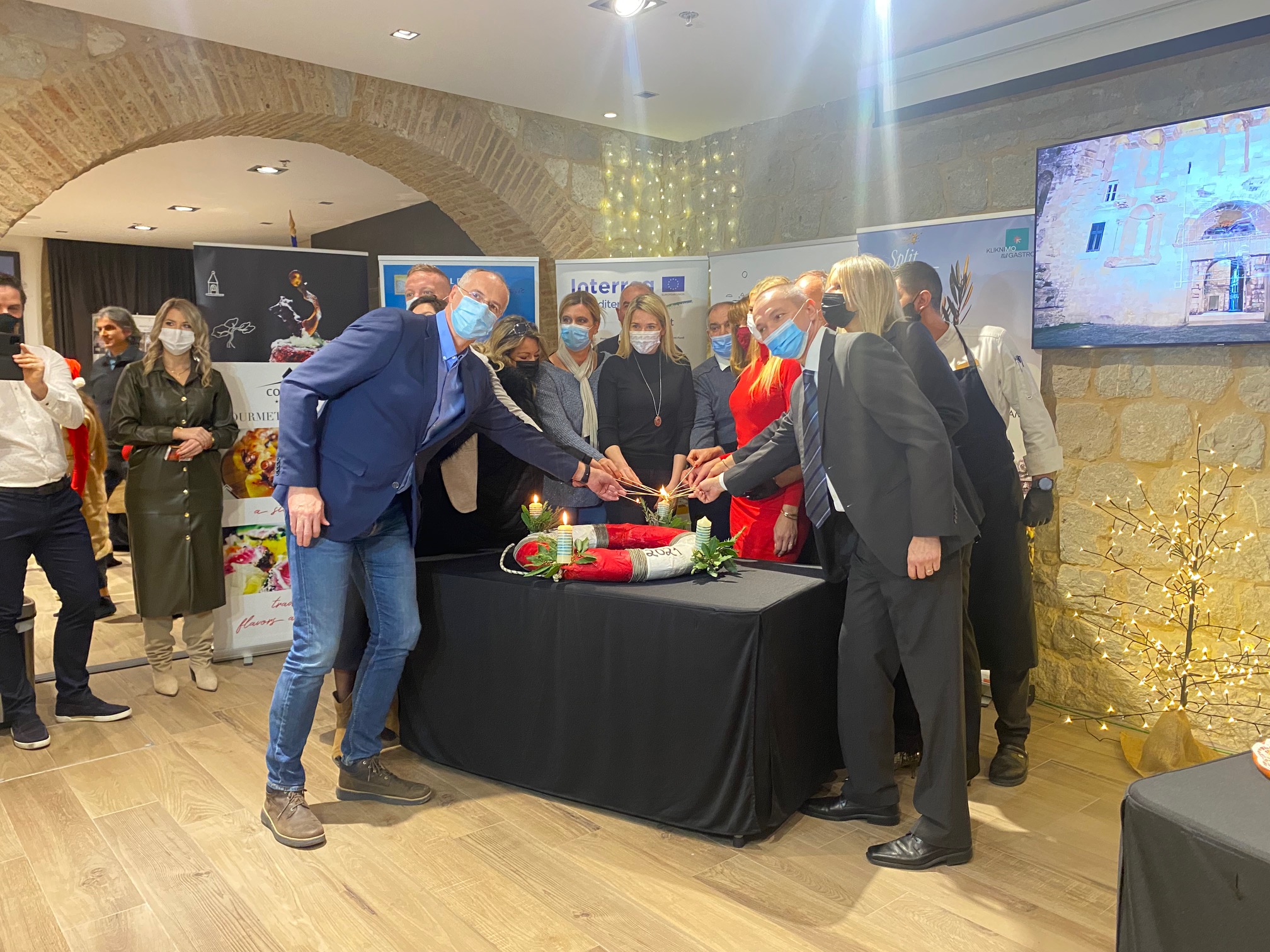
The theme of this year's Gastroadvent is "Mediterranean nutrition is sustainable, achievable, and responsible." In its original form, the stated principle is the basis of action and, as such, should remain the foundation of behavior. The Mediterranean Sea connects all the countries founded on the Mediterranean diet. For the Mediterranean diet to be sustainable, we must responsibly dispose of our waste and use resources rationally.
The holiday season is a time to imbibe and socialize with family and friends, which is why both Dalmatian and Romanian holiday delicacies were in the spotlight at the lighting of the third Advent candle. Romania was honored at today's Gastroadvent thanks to Stjepan Roglić, Honorary Consul of Romania in Split.
The most delicious prosciutto is produced in the Mediterranean region. Resources are used rationally, especially the sea and the bura wind, to obtain a dried ham product. The first recorded mention of prosciutto dates back to 100 BC and is preserved in the Italian city of Parma. And they, just like us, have kept the tradition of producing prosciutto all these years.
But this is more than just a 2,000-year-long tradition. In addition to gastronomic quality, it is essential to know the nutritional facts of prosciutto.
The tradition of Croatian production has been preserved in Hrvace for decades. The Lovrić family researched and produced traditional meat products in the 1980s when every MEL product was created thanks to hard work. The company's wide range includes products made from fresh meat (beef, pork, veal, lamb) and products that bear the "Originally Croatian" and "Croatian Quality" labels. The company MEL-JAKOV LOVRIĆ distributes its products to stores and also supplies restaurants and hotels. MEL products represent the tradition of excellence and the best Dalmatian taste. Alkar salami is their jewel among the products.
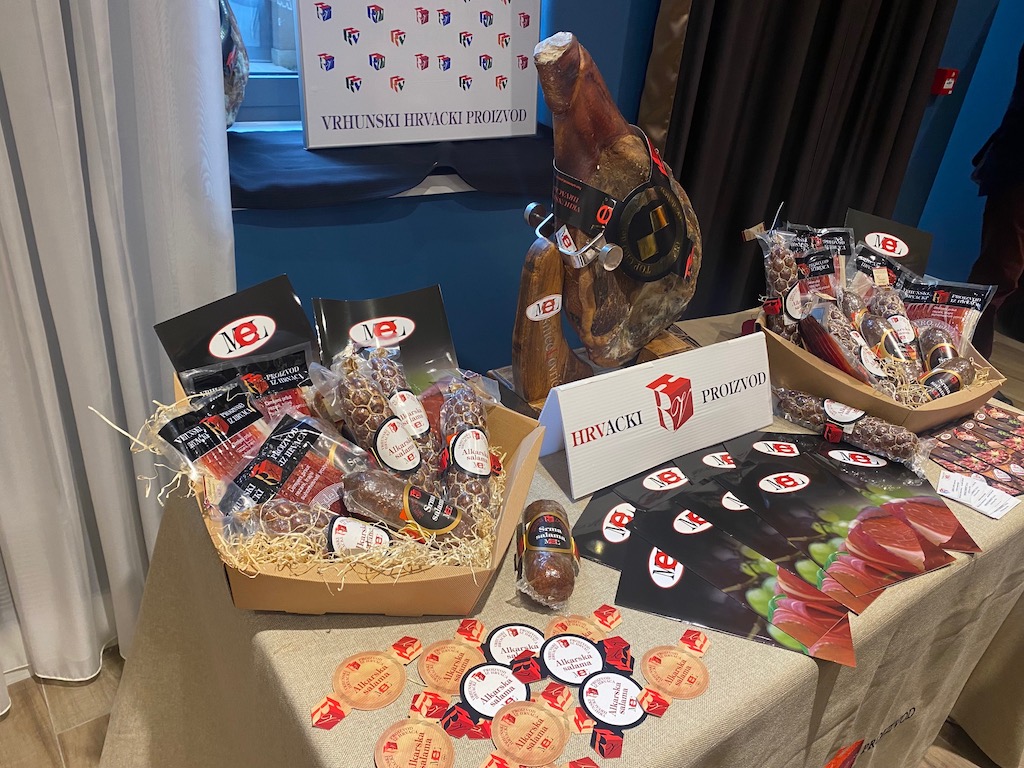
The sumptuous culinary table was designed and prepared by chef Duje Terze (Hotel Cornaro) and his team, paired with Nikolica winery's top-quality 2019 Dingač and Postup, made by the Radović family, Cornaro Hotel owners.
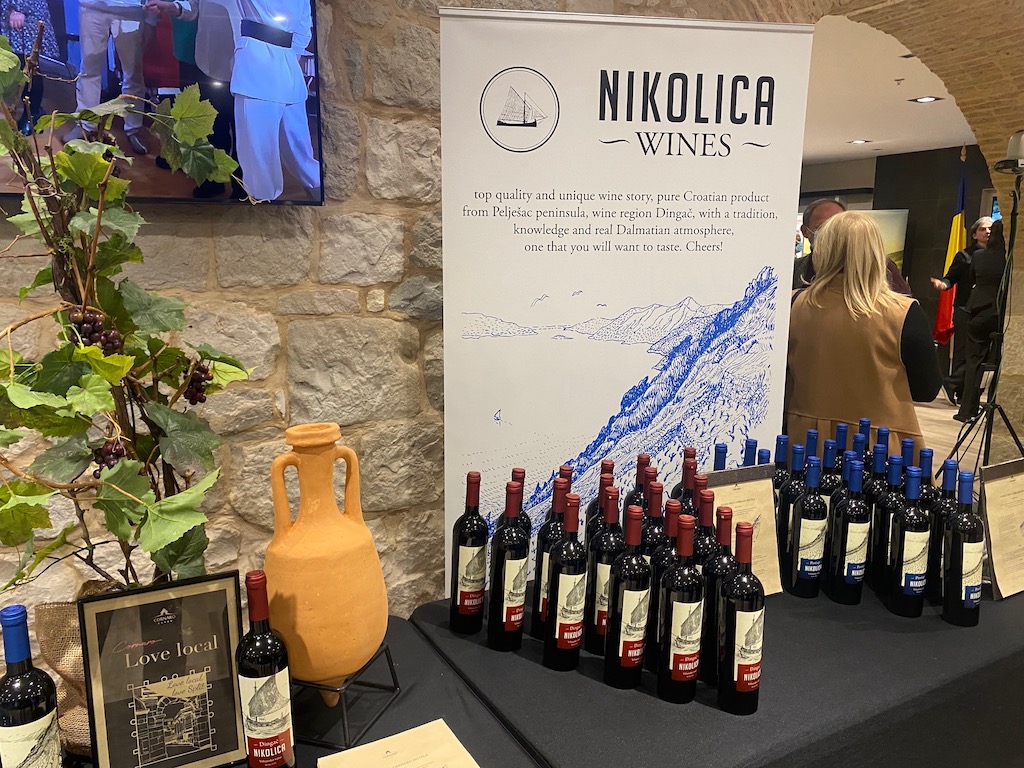
Today's menu included Dalmatian prosciutto with sweet and savory tapenade and skuta, a selection of quality Dalmatian cheeses, chickpea and prosciutto spread, tapenade with olives and prosciutto, puff pastry and prosciutto, bruschetta with onion jam, skuta, and prosciutto, bruschetta with tuna pate, bruschetta with pear, gorgonzola and prosciutto, salty baskets with prosciutto, melon and prosciutto, cold cuts, a selection of quality Dalmatian cheeses, goat cheese and prosciutto tart, Vis pie, foccacia with olives, tomatoes, herbs, bakalar, monkfish fillet wrapped in prosciutto, octopus with prosciutto and chickpeas, homemade gnocchi with prosciutto and sage, tagliatelle with shrimp and prosciutto, veal breast stuffed with prosciutto and leeks, prosciutto,cold salad, French salad, caprese salad, octopus salad, and rožada, Split cake, and fritters for dessert.
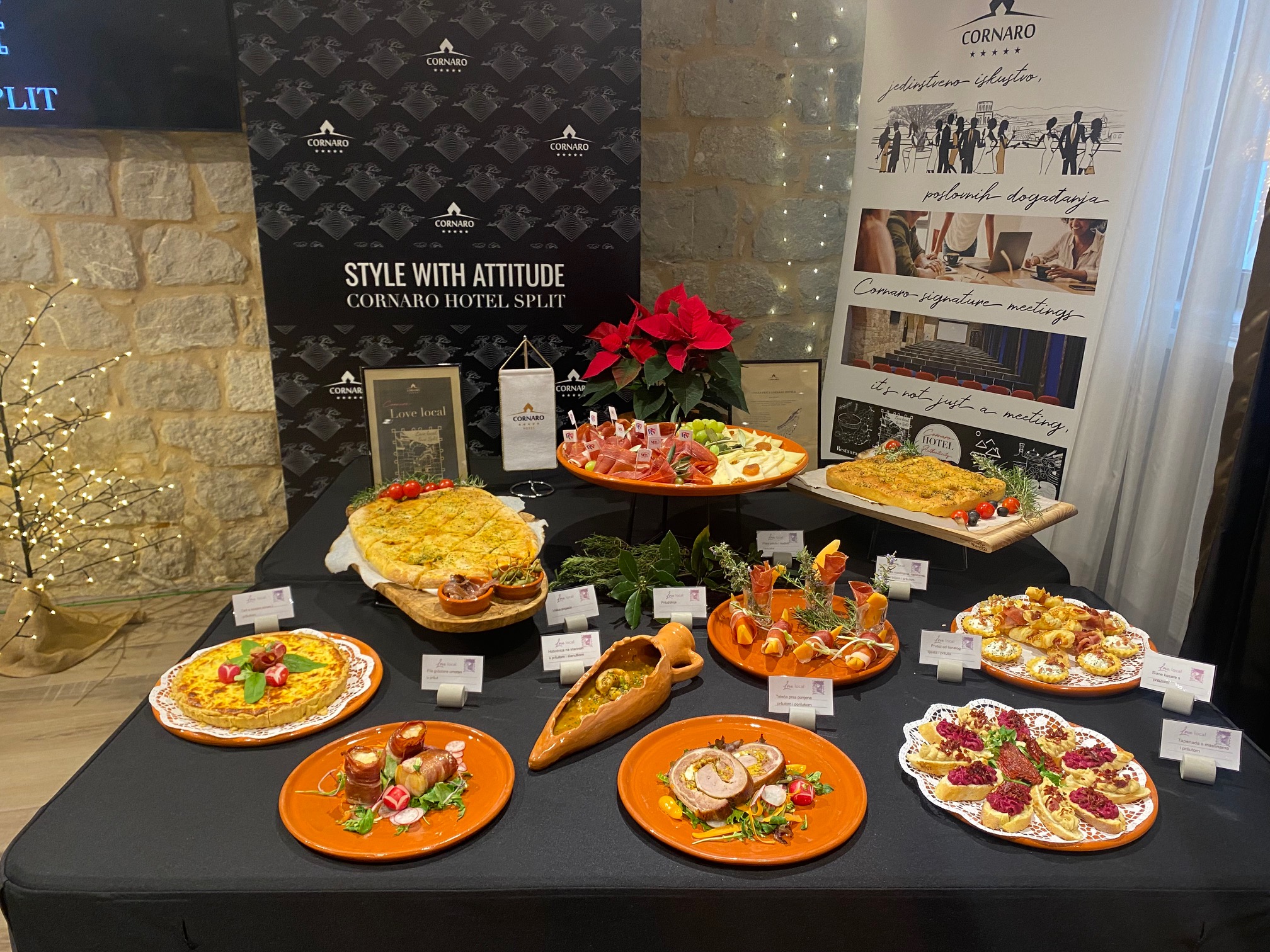
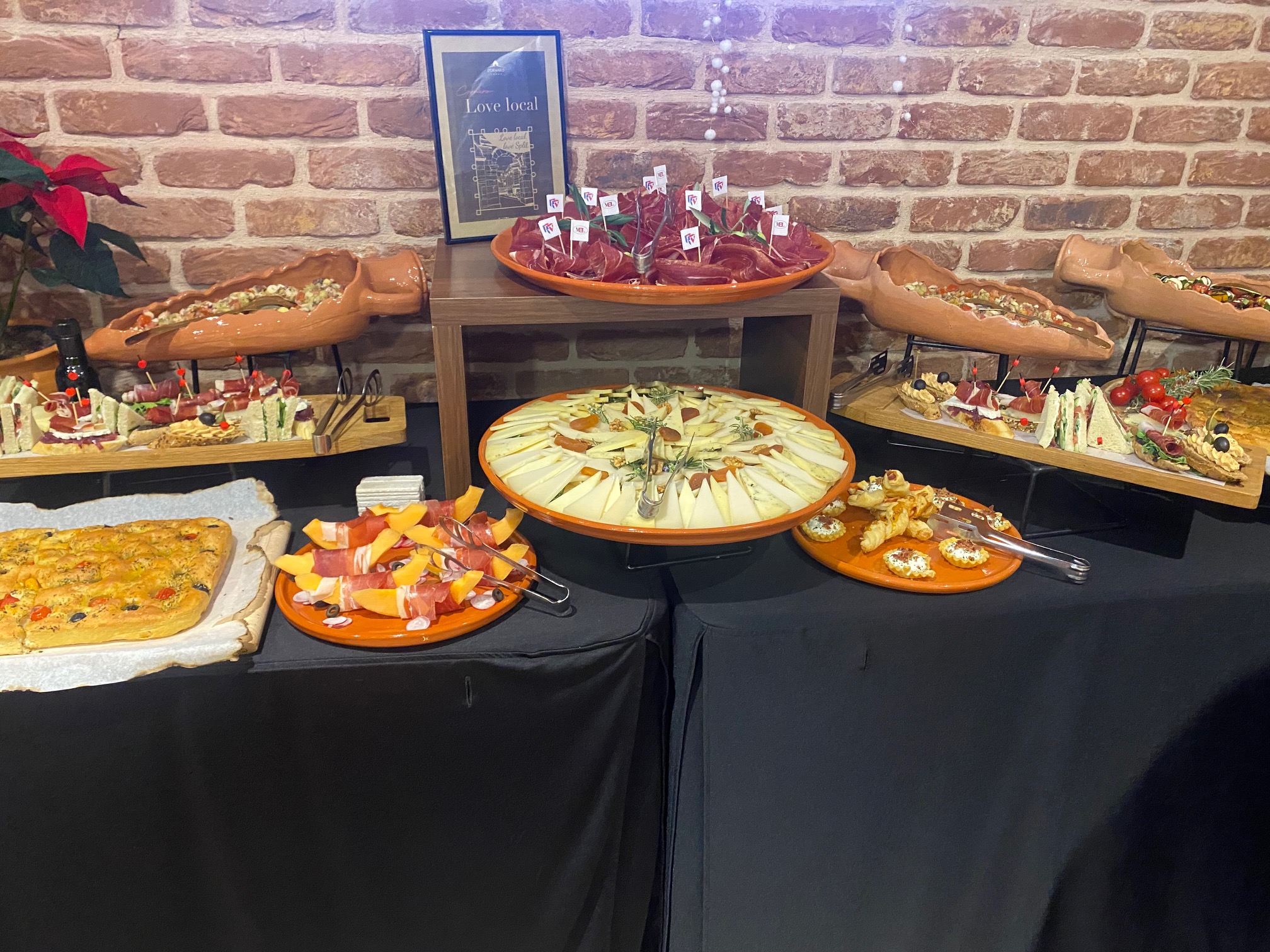
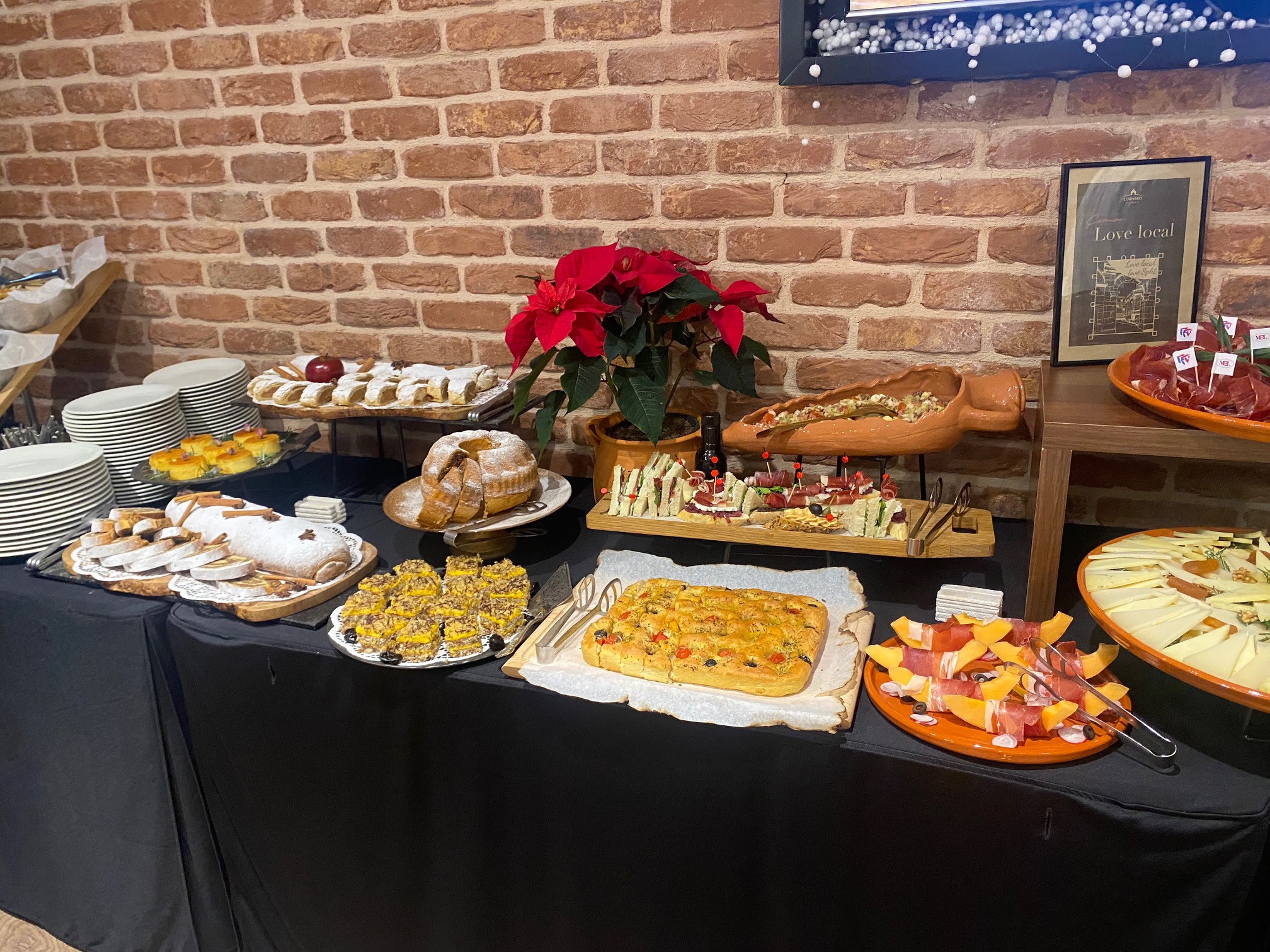
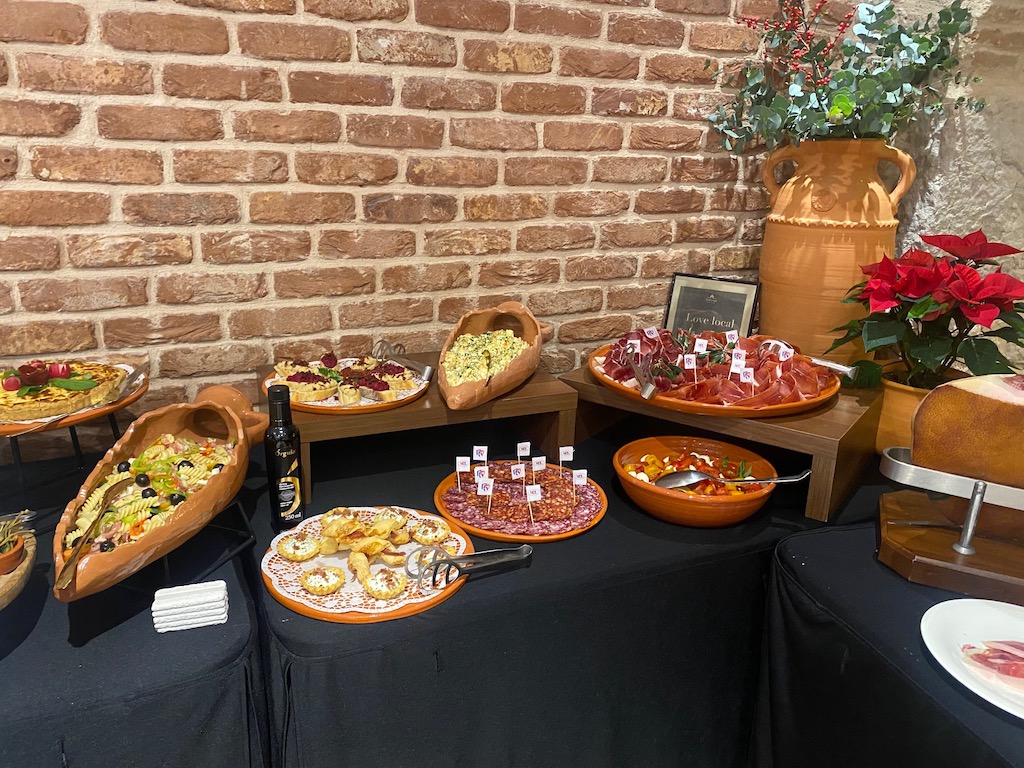
The Romanian food table was presented by Frane Ivan from the Community of Croats in Romania and included mature sheep cheese, cold plates of dried meat products with pickled vegetables, fish caviar spread, traditional vegetable spread, mushroom spread, Christmas cake, sweet quince dessert, salty pretzels, and ROM chocolates and Puffs as gifts for guests to take home!
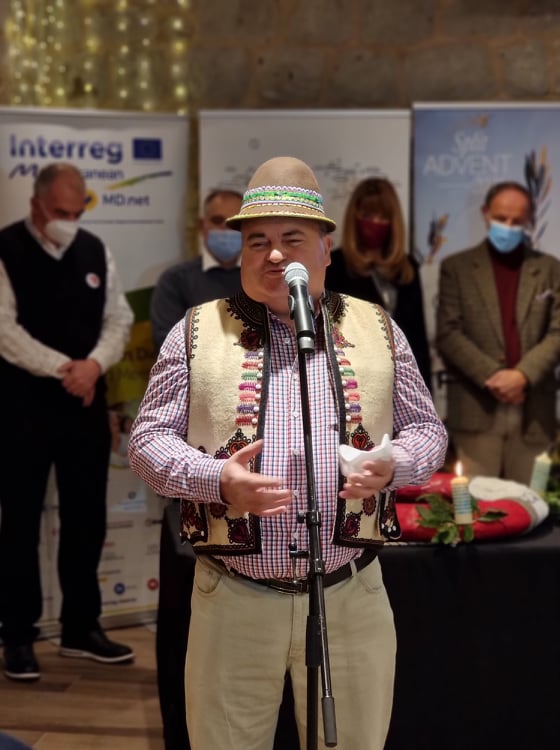
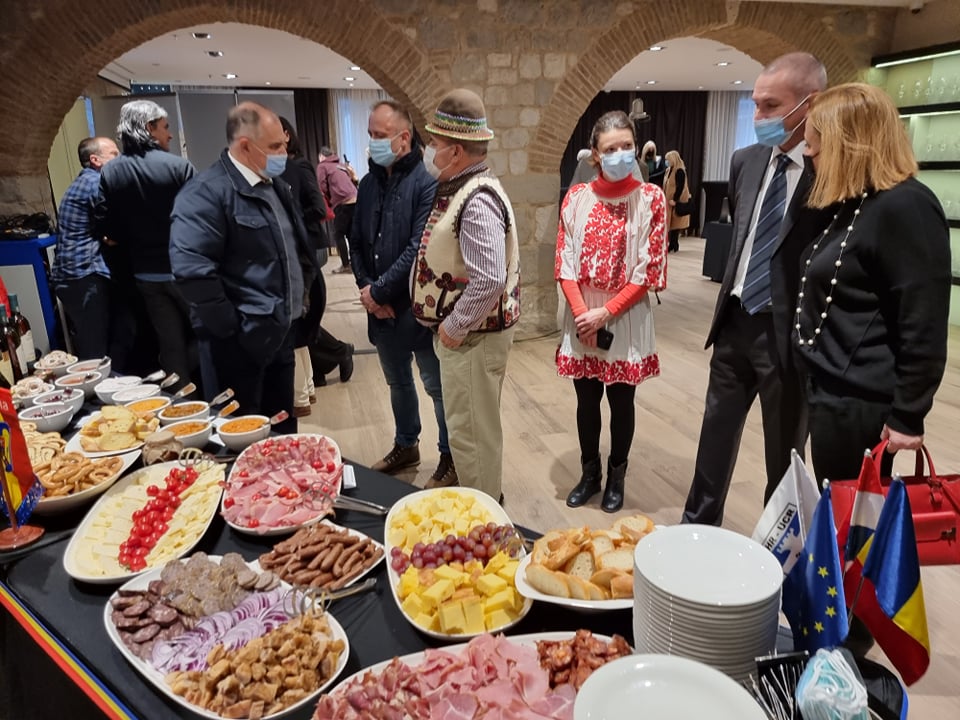
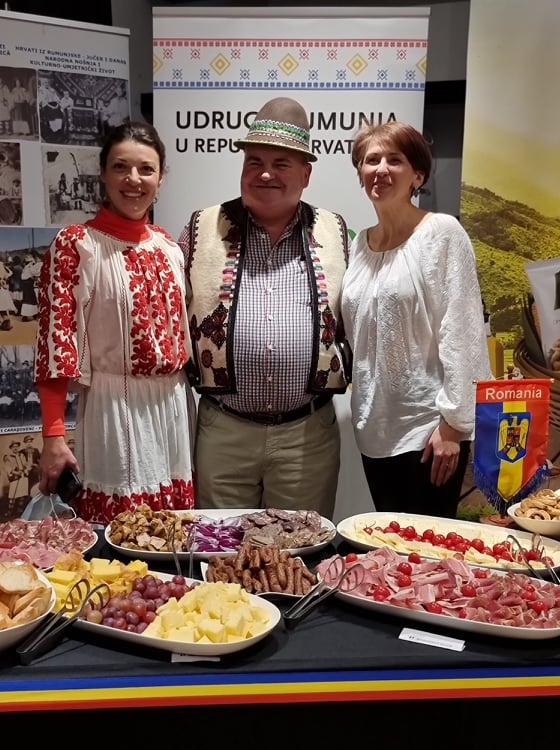
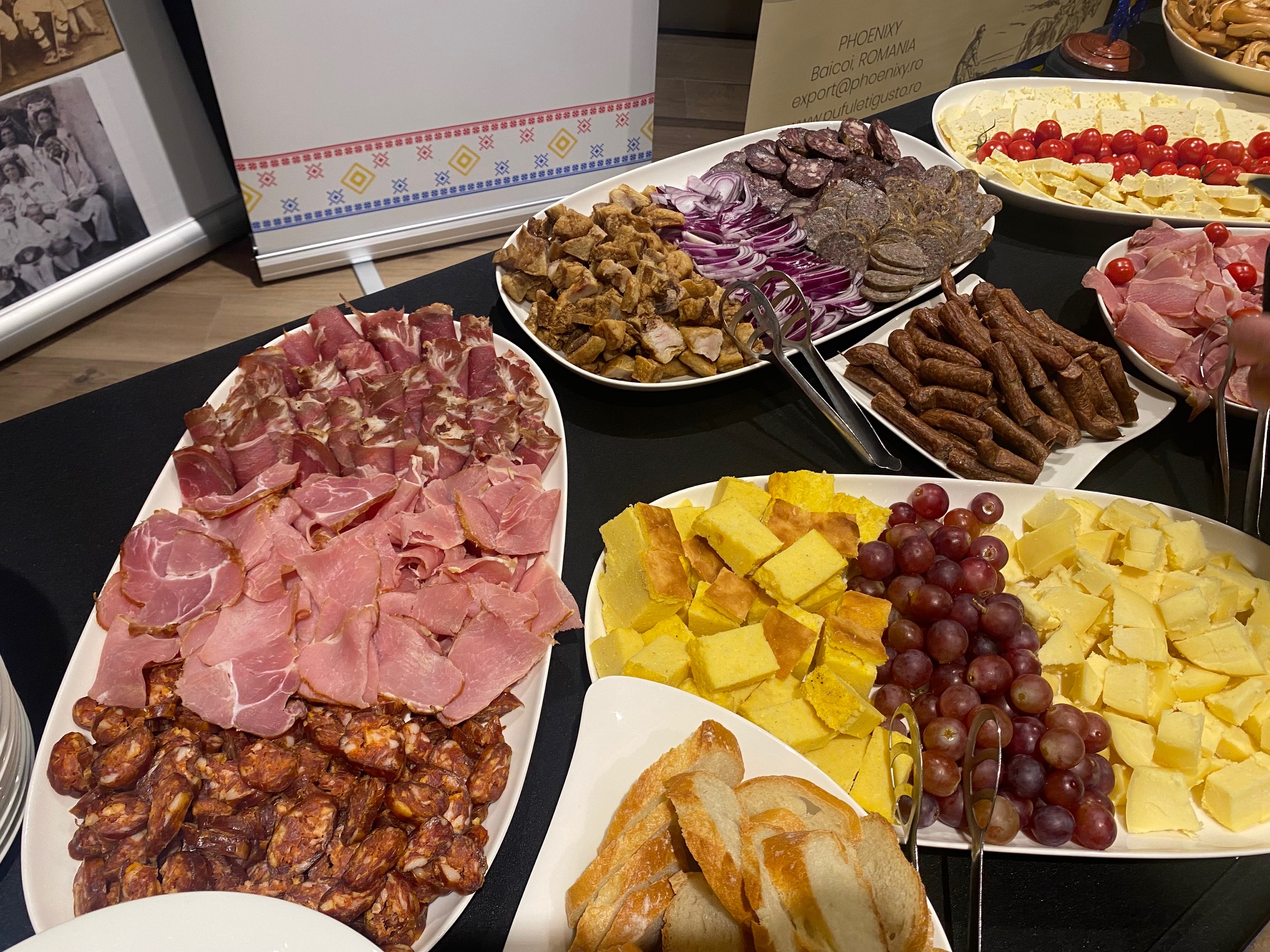
Split-Dalmatia County and the Split-Dalmatia County Tourist Board are avid supporters of Gastroadvent in Split, thus promoting the Mediterranean diet and local producers, entrepreneurs, and tourism workers.
The Split Tourist Board has worked hard to position the destination, harnessing a natural combination of history, gastronomy, and modernity, all to protect the components of the Mediterranean diet. The City of Split is determined to support projects that benefit its residents and demands guests after authentic experiences and new technological opportunities.
The Croatian Chamber of Commerce has advocated for years to encourage the representation of domestic products, and since 1997 has implemented the national project "Let's Buy Croatian." The project aims to increase the consumption of local products and thus support the economy. This project is of particular importance, emphasized by the director Joze Tomaš, and confirmed by the cooperation with Gastroadvent.
JU RERA S.D., as part of the MD.net project to establish innovative food products, has cooperated with primary and secondary schools in Split-Dalmatia County and stakeholders involved in producing or marketing Mediterranean food products and promoting the Mediterranean way of life. The MD.net project focuses on development opportunities and problem-solving related to popularizing the Mediterranean diet. The Mediterranean diet is a part of the Mediterranean identity inscribed in the UNESCO list of intangible cultural heritage. The project aims to strengthen research in this area following the UNESCO Convention on Mediterranean Nutrition, raise the quality of nutrition and life in 9 project partner countries, and promote the Mediterranean diet, which is recognized as the gold standard of proper nutrition with far-reaching health benefits.
Apart from the desire to involve as many people as possible and bring them closer to the importance of the Mediterranean diet in everyday life, as well as its impact on their health, the other goal of the project is to establish a standard in the Med Diet Declaration logo to classify Mediterranean areas. The ultimate goal of awarding the Declaration is to position Split-Dalmatia County as a desirable Mediterranean culinary region.
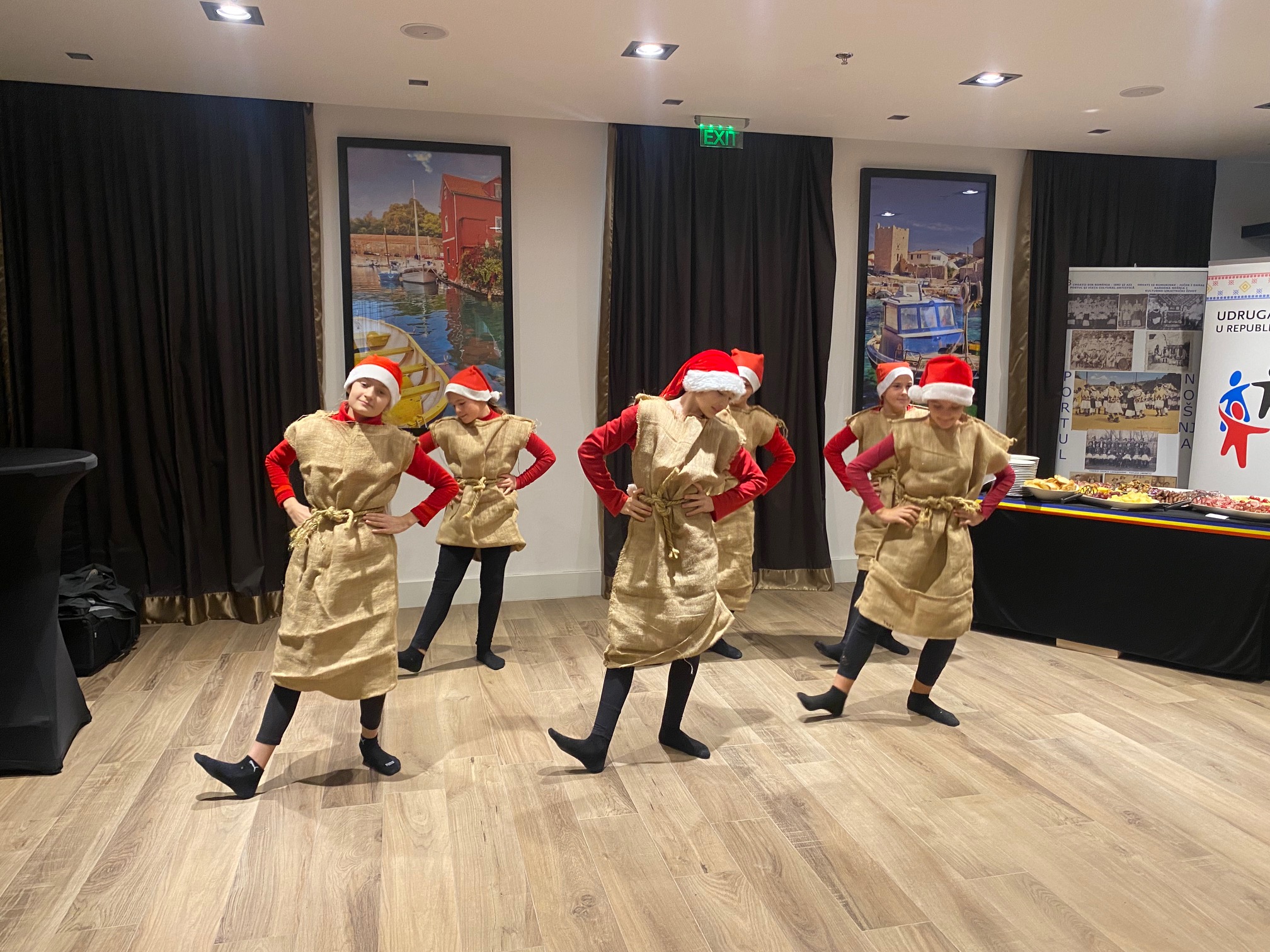
This Sunday's Gastroadvent was enhanced by Dance Studio "Dimache" under the direction and choreography of Remus Dimache, ballet soloist of the Croatian National Theater in Split. For this occasion, Remus Dimache added elements of Romanian folklore to the choreography of modern dance.
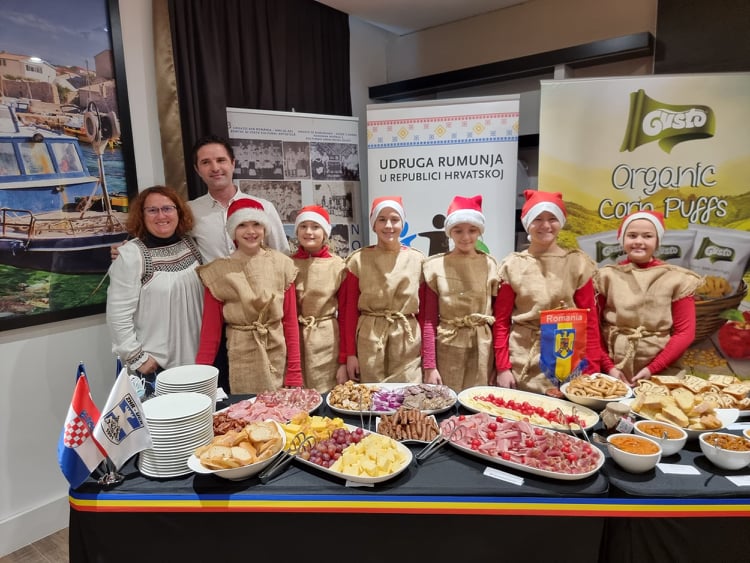
The designer of this year's Gastroadvent wreath is artist Tonka Alujević, who depicted the Advent wreath from a lifebuoy as "a maritime object that serves to save a man who, for various reasons, is helpless in the sea and is in mortal danger." And that is precisely the health and political position we are in at the moment.
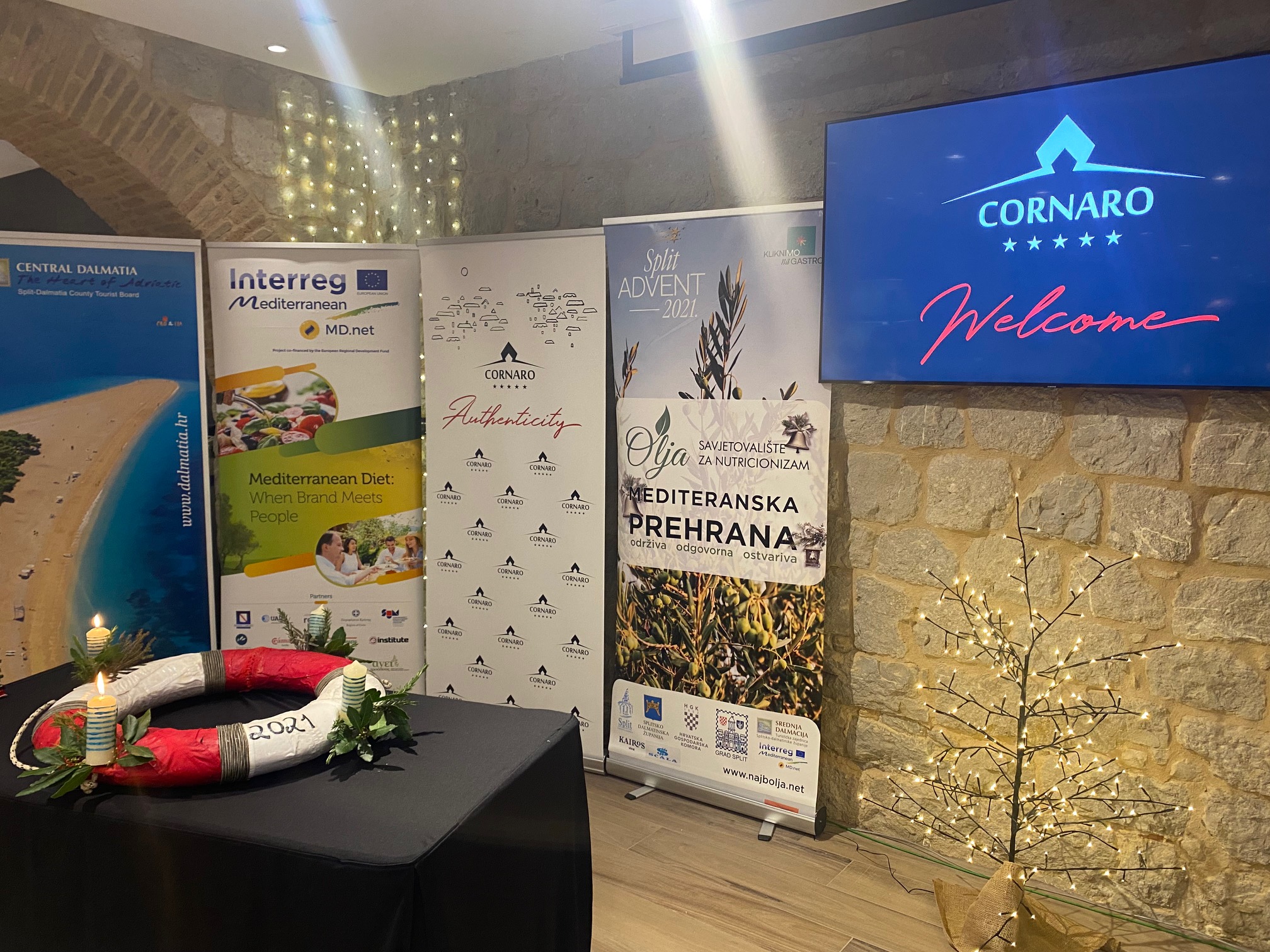
Split Gastroadvent is held every Advent Sunday at a new location, honoring a different group of journalists with new culinary creations at each event.
To read more about lifestyle in Croatia, follow TCN's dedicated page.
2021 Split Beard Auction Sets Record for 'Movember' Donations
December 9, 2021 - 235,282.87 kuna was paid into the Split County League Against Cancer account thanks to the 2021 Split Beard Auction.
"There are two people who are changing the world. One is called Siniša, and the other is Marko. I met them 20 years ago, one as a hairdresser and the other as a neighbor. The fact is that for five years in a row, they have been organizing this action and bringing more love, more energy, more money and more good vibes to the County League Against Cancer than many others," said Dr Eduard Vrdoljak, president of ŽLPR Split, before handing out letters of thanks to Siniša Šunjić and Marko Sučić during the fifth "Split Beard Auction", held last Saturday at Plan B.
Their motive from day one was to organize the Split version of 'Movember' with the simple goal of making their friends, colleagues and acquaintances aware of the importance of preventive check-ups and men's health care. The Beard Auction started in 2017 among friends and acquaintances, collecting around 27,000 and over 240,000 kuna in donations in the first four years. However, a record amount was collected at the 5th edition.
Exactly HRK 235,282.87 was paid into the County League Against Cancer Split account this week.
"We dreamed and hoped, but even in our wildest dreams, we did not believe that we would collect so many donations for the 5th edition. Many thanks to everyone who has come and paid or donated to the Beard Auction at least once in these five years, and to all candidates who sacrificed their masculine appearance for the Beard Auction," said Marko and Siniša.
HRK 20,000 worth of urological free examinations will be added to the total amount. The Split County League Against Cancer will spend this year's donation educating the general public about the importance of preventive examinations.
The Beard Auction is organized by the Split County League Against Cancer with partners: Ka'brada, Rotary Club Split Plus, PromoPlan and Kazinoti & Komenda and barbershops Leekarija Barber Shop, Barbershop Ivan, Barbershop Stil A, Španić Barber from Vinkovci.
"This year, we had a record number of registered beards and mustaches, including students from the Electrical Engineering School Split, especially thanks to them and their professor Ivana Krce Mihovilović. Thank you for your support and VK Jadran and Split motorcycle clubs: BMW Moto Club Dalmatia, MK Vuk Samotnjak, MK Uspomena, MK Reborn, MK Fjaka, MK Desperado, MK 4. gradjska, MK Mirakul Riders, MK Classic Riders, as well as all others without which this year's Beard Auction would not be so successful: Barber Enis Šubo from Sarajevo, Brica Grozdi from Trogir, Spartium natural cosmetics, Mesnica Bokšić, MID, Šime's Butchery, Jameson, Tap B, La Delta, Babaloo Bar, Sidi Bar, Dr Mirnes Selimović, Poliklinika Uglešić, Faculty of Medicine Split, DJ Matthew Bee, the band Little sisters and the whole team of a fantastic host - Plan B!" said the organizers.
To read more about lifestyle in Croatia, follow TCN's dedicated page.
Eurowings Zagreb Flights Reduced, Changes from Split Airport
December 9, 2021 - The latest flights news to Croatia as Eurowings Zagreb flights have been reduced, and operational changes have been made from Split Airport.
German low-cost airline Eurowings, a Lufthansa Group member, will temporarily suspend traffic between Zagreb, Düsseldorf, and Stuttgart in January next year. The start of traffic on the new line to Prague has also been postponed, reports Croatian Aviation.
Although this was not expected as the pandemic is far better than in the same period last year, Eurowings is showing less interest than expected in the capital and has temporarily canceled two lines from Germany to Zagreb, while the newly announced line between Prague and Zagreb will not start so soon.
Eurowings currently operates on three lines to Zagreb, from Stuttgart, Düsseldorf and Cologne.
According to current information, only the line between Cologne and Zagreb will remain in traffic throughout the winter flight schedule. Namely, Eurowings currently operates three times a week, five flights a week have been announced for Christmas, and from January 14, a reduction to two flights a week has been announced - on Fridays and Sundays.
The last flight on the line between Zagreb and Düsseldorf, which Eurowings introduced at the end of this summer, took place on November 27, and all flights after that date were canceled. The company will operate only four return flights between December 18 and 28, at the time of peak demand, while other flights in December and January were canceled. According to current announcements, Eurowings should operate on this line again from February 8, 2022.
The Stuttgart - Zagreb - Stuttgart route operates three times a week, by January 9 the number of weekly flights will increase to five, while all other flights have been canceled after that date. The line will be re-established on February 7.
The new line announced by Eurowings this year between Prague and Zagreb has had several operational changes so far. Although the flights were announced for December, this will not happen. The airline canceled all announced operations between the two cities until February 8 next year, after which one flight a week has been announced. Given the numerous delays, it is to be expected that this line will not start operating until at least the beginning of spring.
Eurowings is also present at Split Airport in the winter flight schedule. Eurowings operates on two lines to Split - from Stuttgart and Düsseldorf. There have been operational changes on these lines as well.
The Stuttgart - Split line operates twice a week, on Thursdays and Sundays. Before the holidays, a flight will be added on Tuesdays, and from January 9, the line will be interrupted until mid-February.
The Split - Düsseldorf line operates on Wednesdays and Saturdays, and from January 8, the flight will be canceled on Wednesdays and operations will be suspended on Saturdays until mid-February, when two flights a week should be available again.
For more on flights to Croatia and other travel announcements, make sure to check out our dedicated travel section.
Get into the Holiday Spirit: Wreath-Making Workshop at Zinfandel Food & Wine Bar in Split
December 8, 2021 - Another excellent business is giving back to the community for locals and foreigners in the Split offseason with a wreath-making workshop at Zinfandel Food & Wine Bar!
When the summers are slammed with luxury weddings and events, professional florist Anita of Floranita Flower Design has found a way to stay busy even in the slower offseason, allowing locals and foreigners to develop a new skill over winter.
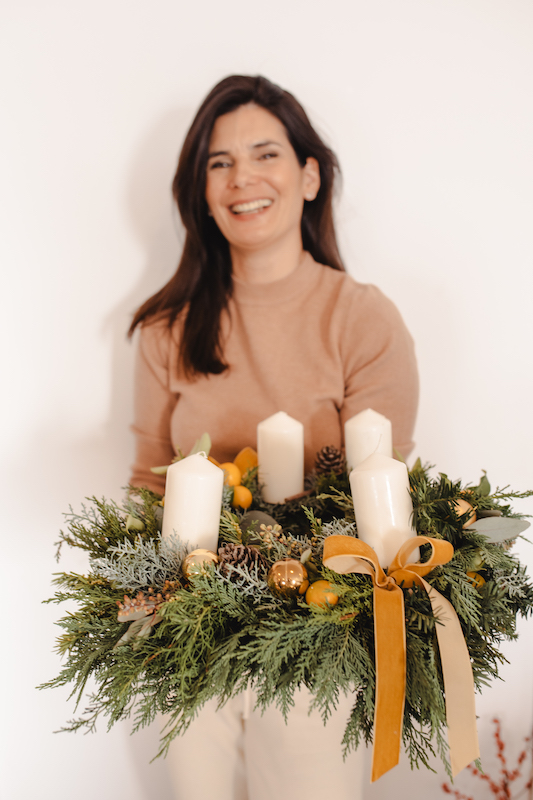
Namely, after a successful workshop held in Šibenik last week, Anita is hosting an Advent wreath-making workshop to kick off the Christmas season in Split!
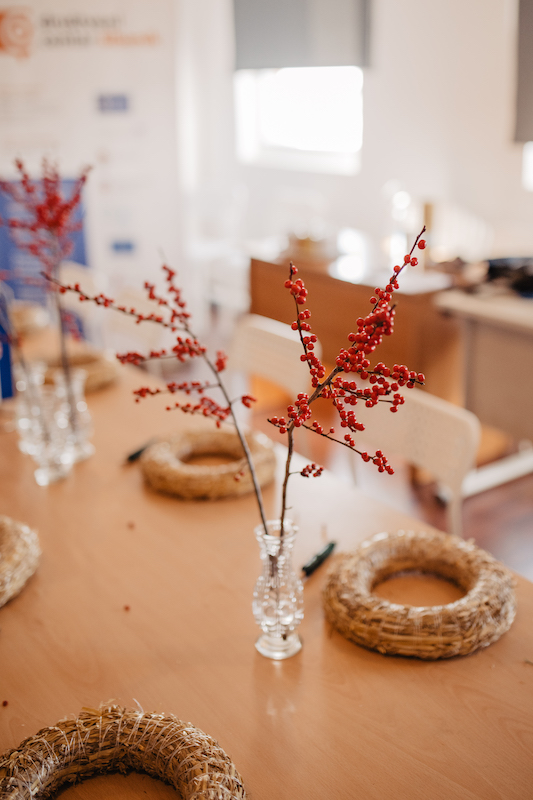
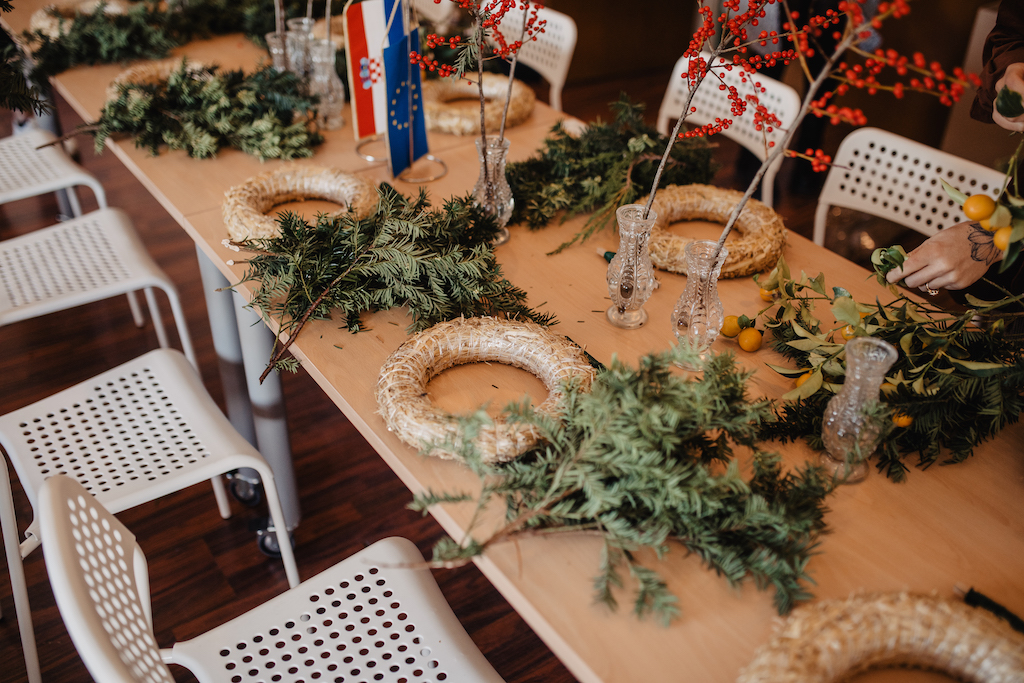
On Thursday, December 8, at 11:30 am, Zinfandel Food & Wine Bar in Split will host Anita's wreath-making workshop, allowing participants to create a beautiful Christmas wreath that can be hung on their door or as an Advent centrepiece!
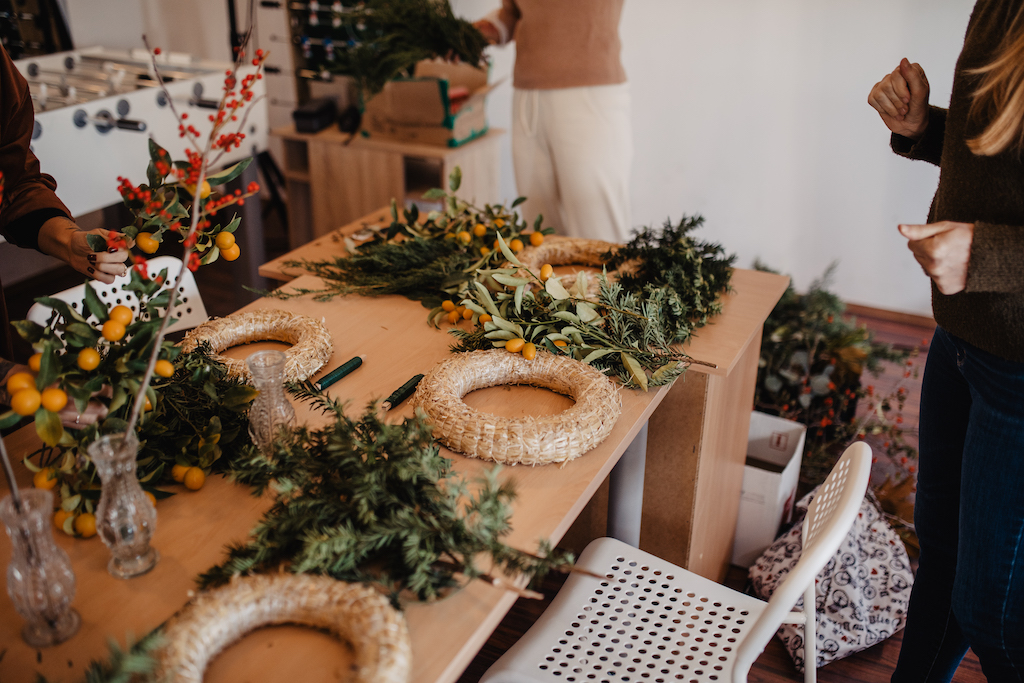
On arrival, all participants will be offered a glass of Prosecco and a festive mince pie.
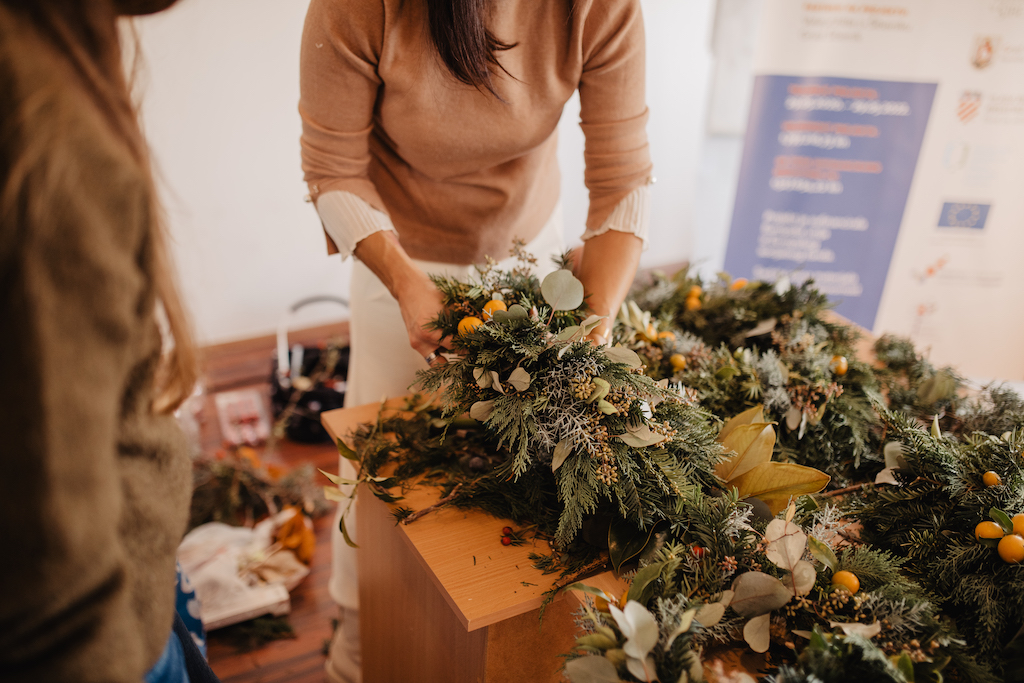
Participants will be given all materials alongside a mix of foliages with seasonal decor to choose from. If participants have a specific ribbon or decoration that they would like to add, they are welcome to bring it along.
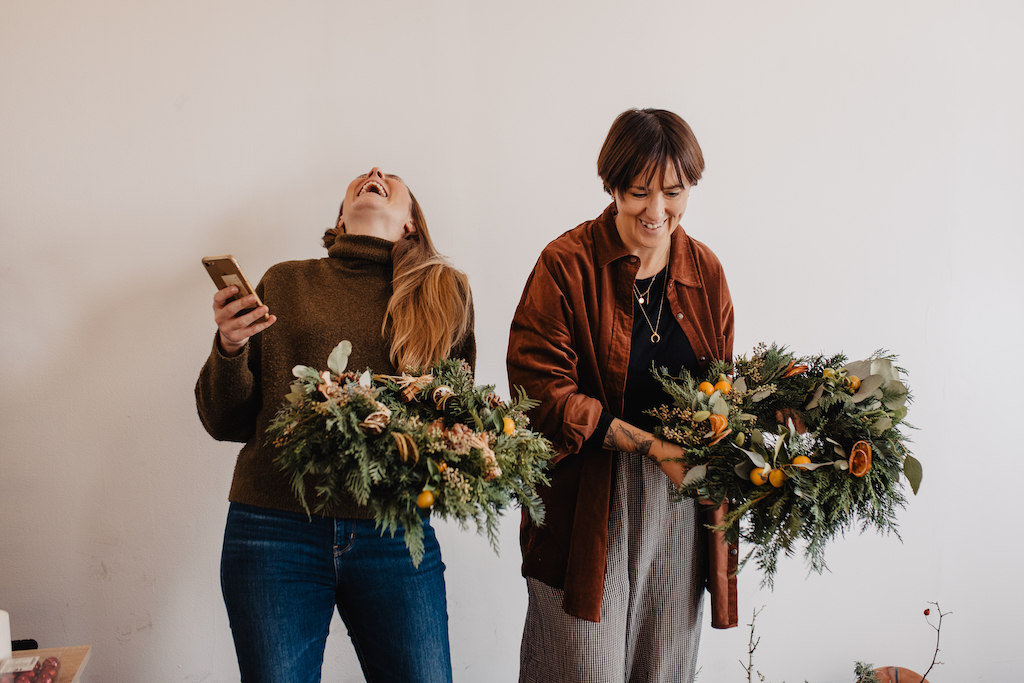
The workshop will last two hours and costs 400 kuna. Numbers are limited to 12 people, so you are encouraged to reserve your spot quickly!
All photos by Sanja Lydia
To read more about lifestyle in Croatia, follow TCN's dedicated page.
Zvončac Advent Festive Train Announced from Sv. Frane in Split!
December 7, 2021 - Advent in Split is even richer this year - ride to Zvončac Advent in style with a festive train from Sv. Frane every day!
'Click on Advent' is the theme of this year's Split Advent, so visitors near and far can 'click' on gastronomy, culture, and games thanks to a new website, ensuring Split's festive season is never too away.
A handful of exciting events will be held this year in various micro-locations around the city, including the Cornaro ramparts, Perivoj, Imaginarium Advent Zvončac, and Mertojak.
One of the most interesting locations this year is Imaginarium Advent at Zvončac Park, which opened its program with the Split Majorettes, Alen Islamović & Thrill Band last week. In addition to a packed concert program, UJE oil bar, Bajamonti Pizza, Steak & Fish House, Konoba Lanterna Siber, Mazzgoon, Charlie's Bar, Moby Dick, Caffe Bar - Bistro NoStress, BEPA, and ZINNY are providing tasty culinary creations to enhance the Advent atmosphere at their holiday houses.
The organizers announced a colorful concert program as well, with Petar Dragojević playing on his uncle Oliver's birthday (December 7), Gustafi, and Split favorite TBF to ring in the new year.
But that's not all.
If you were worried about how you'd get to Zvončac, fret not - an Advent train will depart from Sv. Frane to Zvončac every day! The train costs 5 kuna per passenger and will work on Monday to Friday from 5 pm to 10 pm, and on Saturday and Sunday from 12 pm to 10 pm.
Admission is free to Zvončac Advent and Covid certificates are required for the evening part of the program, which begins at 7 pm. For those who do not have a Covid certificate, testing is available at the entrance for 50 kuna.
You can find the full program at: https://advent.imaginarium.hr
Advent Zvončac is organized by Imaginarium Events & Weddings with Radio Dalmacija as the media sponsor. Other sponsors are the Croatian National Theater in Split, President Hotels, and the Split Tourist Board.
To read more about lifestyle in Croatia, follow TCN's dedicated page.
2021 Split Gastroadvent Lights Up Dvor with Prosciutto Creations by Chef Hrvoje Zirojević
December 5, 2021 - The second Split Gastroadvent candle was lit on Sunday by portal journalists and representatives of Split-Dalmatia County. The event is traditionally organized by famous dietician and nutritionist Olja Martinić. This Sunday's Advent candle was lit for peace and love, with prosciutto creations by famed chef Hrvoje Zirojević.
Gastroadvent is a unique event that has promoted the Mediterranean diet for decades through a fusion of nutrition, gastronomy, and tourism. Thanks to the engagement and participation of dedicated journalists, who continue to bring light to Split, the event persistently shares scientific knowledge woven into gastronomic skills, the numerous health benefits of the Mediterranean diet, and the preparation of dishes from unique ingredients.
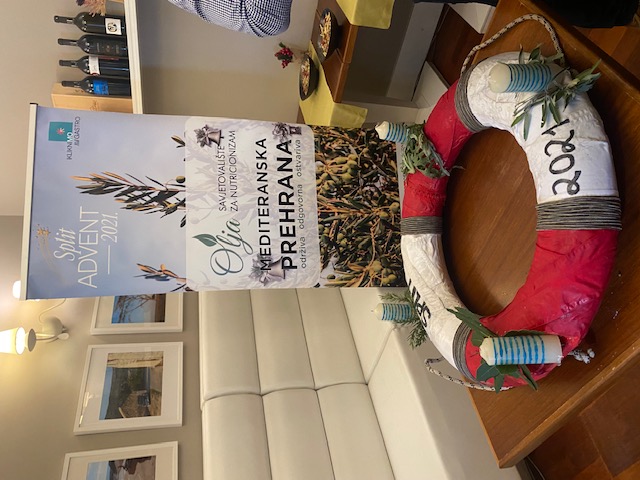
The theme of this year's Gastroadvent is "Mediterranean nutrition is sustainable, achievable, and responsible." In its original form, the stated principle is the basis of action and, as such, should remain the foundation of behavior. The Mediterranean Sea connects all the countries founded on the Mediterranean diet. For the Mediterranean diet to be sustainable, we must responsibly dispose of our waste and use resources rationally.
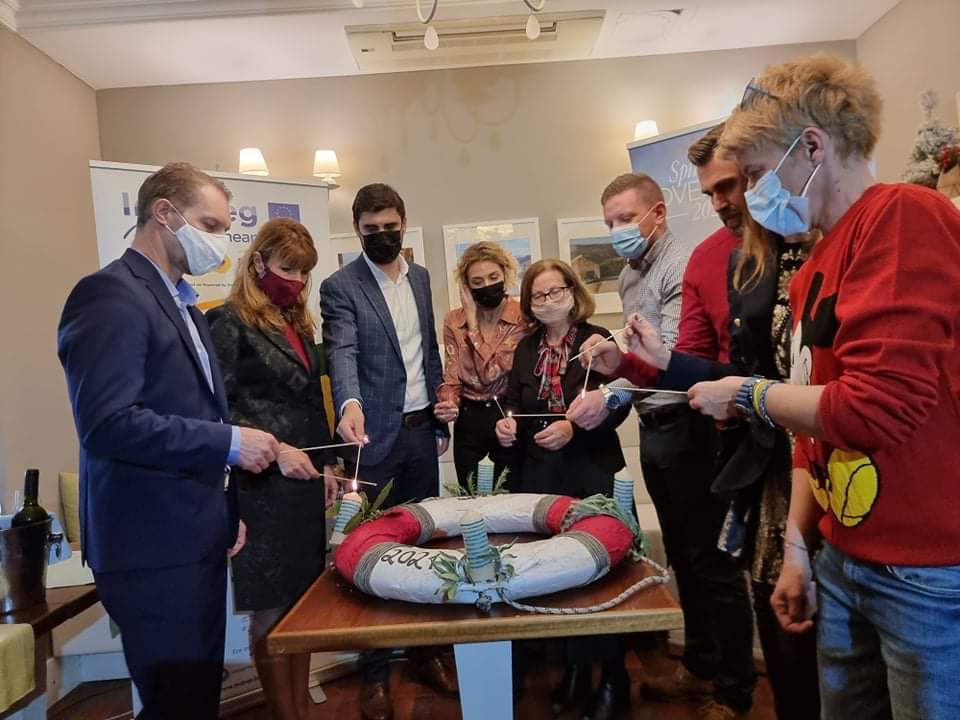
The most delicious prosciutto is produced in the Mediterranean region. Resources are used rationally, especially the sea and the bura wind, to obtain a dried ham product. The first recorded mention of prosciutto dates back to 100 BC and is preserved in the Italian city of Parma. And they, just like us, have kept the tradition of producing prosciutto all these years.
But this is more than just a 2,000-year-long tradition. In addition to gastronomic quality, it is important to know the nutritional facts of prosciutto.
Namely, 100 g of prosciutto contains:
Calories: 280 kcal
Carbohydrates: 0.3 g
Fat: 18.3 g
Protein: 25.9 g
Vitamins
Vitamin B1 (thiamine) - 82% RDA
Vitamin B2 (riboflavin) - 16% RDA
Vitamin B3 (Niacin) - 37% RDA
Vitamin B6 (pyridoxine) - 81% RDA
Vitamin B12 (cobalamin) - 27% RDA
Vitamin B9 (folate) - 6% RDA
Vitamin E (tocopherol) - 2% RDA
Minerals
Calcium - 1% RDA
Copper - 3% RDA
Iron - 6% RDA
Magnesium - 5% RDA
Manganese - 1% RDA
Potassium - 27% RDA
Phosphorus - 26% RDA
Selenium - 20% RDA
Zinc - 23% RDA
Prosciutto is relatively rich in nutrients, and their relationship is synergistic. It is essential to emphasize that prosciutto and pork products primarily contain oleic acid, which is necessary for all those who take care of quality fatty acids. We can rightly say that prosciutto and related products, in the diversity of the Mediterranean diet, have guaranteed the sustainability of health for generations.
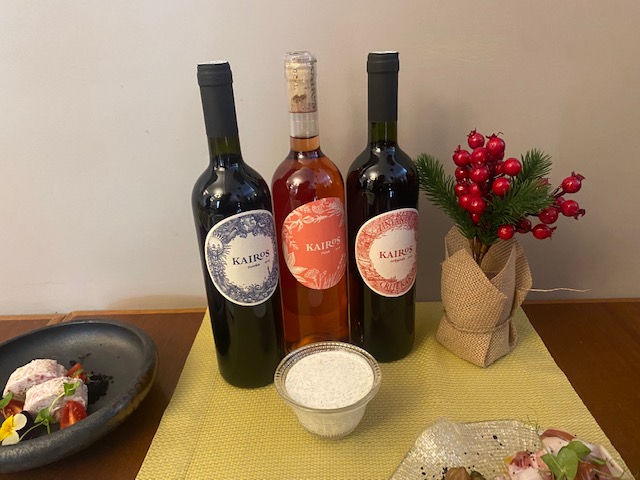
The sumptuous gastronomic table with dishes, prepared and served following current epidemiological measures, was the work of Caffe-restaurant Dvor under the baton of a distinguished chef, Hrvoje Zirojević, paired with Pošip and Crljenak wines from Kairos winery.
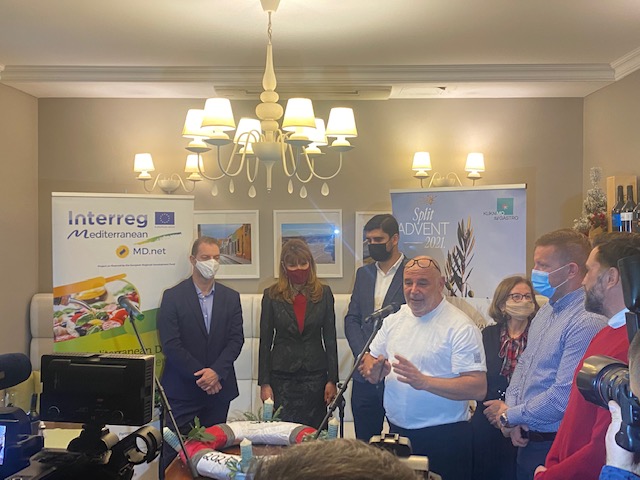
This Sunday's menu included goose liver wrapped in prosciutto with brioche, prosciutto pesto, prosciutto and bacon with pickled vegetables and herbs, prosciutto and sauerkraut strudel, white cod with bacon chips, cod stew with bean paste and prosciutto pesto, saltimbocca, pljukanci with prosciutto, truffles, and mushrooms, and cream of pumpkin soup with prosciutto chips.
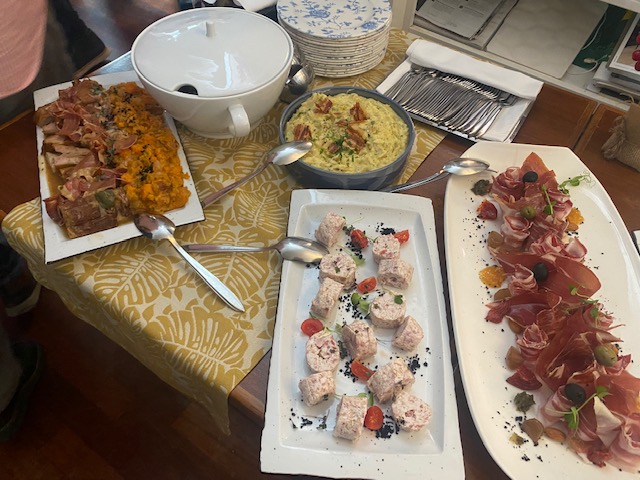
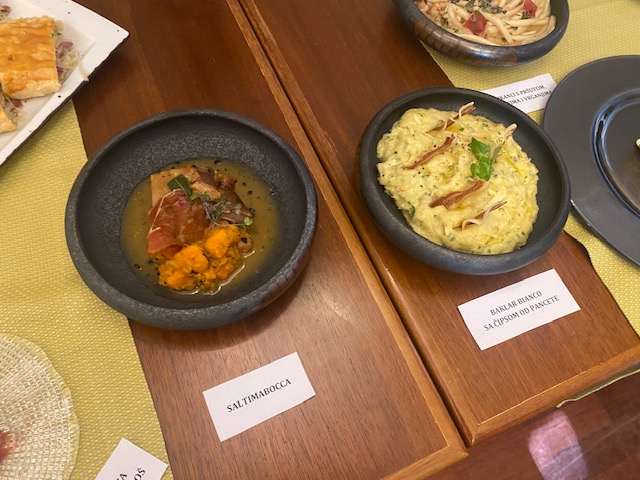
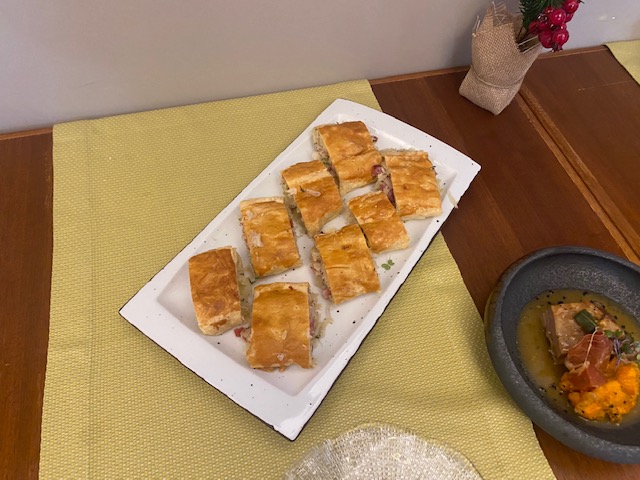
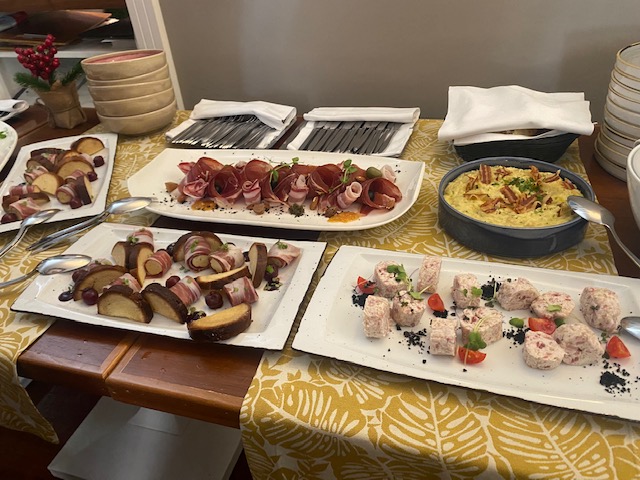
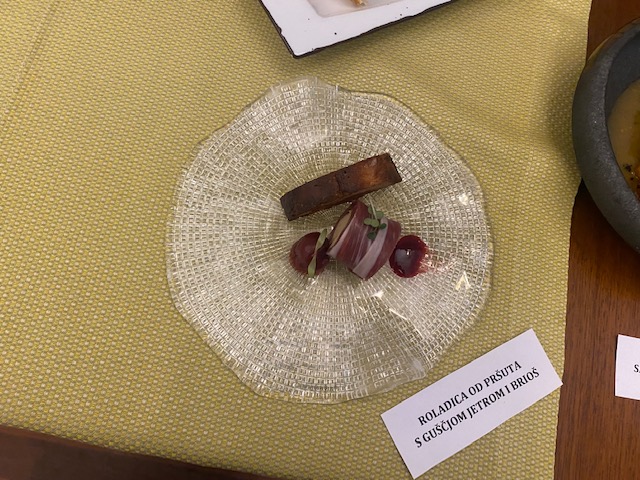
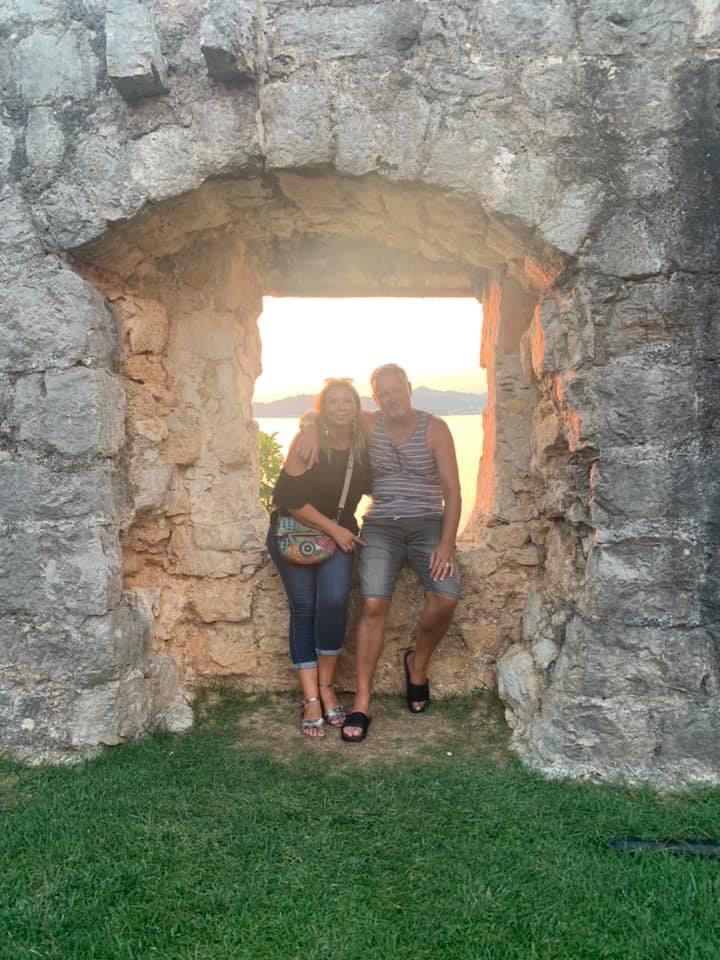
Split-Dalmatia County and the Split-Dalmatia County Tourist Board are avid supporters of Gastroadvent in Split, thus promoting the Mediterranean diet and local producers, entrepreneurs, and tourism workers.
The Split Tourist Board has worked hard to position the destination, harnessing a natural combination of history, gastronomy, and modernity, all to protect the components of the Mediterranean diet. The City of Split is determined to support projects that benefit its residents and demands guests after authentic experiences and new technological opportunities.
The Croatian Chamber of Commerce has advocated for years to encourage the representation of domestic products, and since 1997 has implemented the national project "Let's Buy Croatian." The project aims to increase the consumption of local products and thus support the economy. This project is of particular importance, emphasized by the director Joze Tomaš, and confirmed by the cooperation with Gastroadvent.
JU RERA S.D., as part of the MD.net project to establish innovative food products, has cooperated with primary and secondary schools in Split-Dalmatia County and stakeholders involved in producing or marketing Mediterranean food products and promoting the Mediterranean way of life. The MD.net project focuses on development opportunities and problem-solving related to popularizing the Mediterranean diet. The Mediterranean diet is a part of the Mediterranean identity inscribed in the UNESCO list of intangible cultural heritage. The project aims to strengthen research in this area following the UNESCO Convention on Mediterranean Nutrition, raise the quality of nutrition and life in 9 project partner countries, and promote the Mediterranean diet, which is recognized as the gold standard of proper nutrition with far-reaching health benefits.
Apart from the desire to involve as many people as possible and bring them closer to the importance of the Mediterranean diet in everyday life, as well as its impact on their health, the other goal of the project is to establish a standard in the Med Diet Declaration logo to classify Mediterranean areas. The ultimate goal of awarding the Declaration is to position Split-Dalmatia County as a desirable Mediterranean culinary region.
Special partners of this year's Gastroadvent are Scala d.o.o. and Kairos winery. The "Mediterranean Food 2021" event host is Scala d.o.o. from Split in cooperation with the Olja Nutrition Counseling Center.
The designer of this year's Gastroadvent wreath is artist Tonka Alujević, who depicted the Advent wreath from a lifebuoy as "a maritime object that serves to save a man who, for various reasons, is helpless in the sea and is in mortal danger." And that is precisely the health and political position we are in at the moment.
Split Gastroadvent is held every Advent Sunday at a new location, honoring a different group of journalists with new culinary creations at each event.
To read more about lifestyle in Croatia, follow TCN's dedicated page.


